
LATIN AMER ICAN IST THE CENTER FOR LATIN AMERICAN STUDIES UNIVERSITY OF FLORIDA VOLUME 53 | NO. 2 DECEMBER 2022 In this issue: GABRIELA ALEM Á N ≈ UF IN CUSCO STUDY ABROAD ≈ OUTREACH ≈ PARTNERSHIPS ≈ STUDENT WORK ≈ FACULTY SPOTLIGHT ≈ ALUMNI EXCELLENCE ≈ and more
DR. CARLOS DE LA TORRE
Let me start by welcoming our new MALAS and MDP student cohorts, and thanking staff, students, and faculty for their hard work for the Center. We started the semester with high spirits learning that the Center was recognized as a National Resource Center by the Department of Education and was also awarded the Foreign Language and Area Studies Fellowships (FLAS). Working on these proposals was a collective endeavor of faculty and staff. Thank you all!
We welcomed Dr. Clate Korsant as Assistant Director of Academic Affairs. He is an Anthropologist, documentary filmmaker and ethnographer focusing on political ecology and political economy of Latin America. We hosted our first Kislak Family Foundation Writer in Residency Dr. Gabriela Alemán. She has a PhD from Tulane, obtained a Guggenheim fellowship, and was named member of the Real Academia de la Lengua in Ecuador. Dr. Alemán taught a course on short stories and creative writing in Spanish. Three short stories by our students are enclosed in this issue (pp. 8-10). Dr. Alemán also organized an Ecuadorian film series and invited the four directors to comment on their films. Alemán’s second book translated to English, Family Album, was launched by professor Nicolás Campisi from Georgetown.
After canceling the Center’s annual reception for two years, we were finally able to host one of our awardees, Marcela Márquez-García from Chile. Unfortunately, the winner of the lifetime achievement award Frank Santeiro could not come to the
celebration in person. We continued with our efforts to recreate community. TCD’s Tropilunch met in person every Tuesday hosting talks by graduate students, alumni, and professors. Dr. Weildler Guerra Curvelo lectured on the Colombian elections, and Dr. Anthony Pereira on the elections in Brazil. Our students Maricarmen Torres Medina, Kleber Naula, and Francisco Sánchez organized a well-attended event on photography, theory, ethnography, and life histories. Spencer Rohlwing finished his MA degree in three semesters with a perfect GPA and a strong thesis.
Next semester we will host Dr. Solsiree del Moral as the Spring 2023 Bacardi Family Eminent Scholar. She will teach a course on AfroLatin American History and be the keynote speaker of our annual conference entitled “Anti-racist education in Latin America: Perspectives on State and Grassroots Projects,” March 23-25, 2023. We are looking forward to Dr. Del Moral’s course and talks as she will also present her work in progress at our faculty colloquia.
The Center will continue to grow, as we are hopefully hiring three assistant professors to join us in the Fall 2023. We are looking forward to hosting lectures by candidates for the positions in Afro-Latin American Literature, Gender and Sexuality Social Movements in Latin America, and Latino/a/x Studies.
Center for Latin American Studies 319 Grinter Hall PO Box 115530 Gainesville, FL 32611-5530 (352) 273-4705 latam.ufl.edu
CENTER-BASED FACULTY

Carlos de la Torre Director
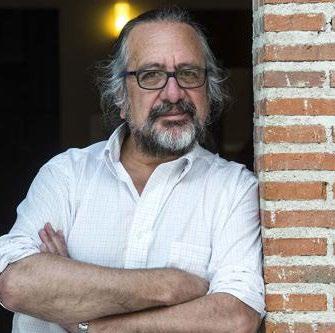
Emilio Bruna (LAS/WEC)
Christopher L. Busey (LAS/Education)
Joel Correia (LAS)
Jonathan Dain (LAS/SFRC)
Glenn Galloway Director, MDP (LAS)
Rebecca Hanson (LAS/Sociology)
Karen Kainer (LAS/SFRC)
Clate Korsant Asst. Director of Academic Affairs (LAS/Anthropology)
Bette Loiselle Director, TCD (LAS/WEC)
Carmen Martínez Novo (LAS)
Timothy Murtha (LAS/DCP)
Susan Paulson (LAS)
Mary Risner Assoc. Director, Outreach & LABE (LAS)
J. Richard Stepp (LAS/Anthropology)
Carlos Suárez Carrasquillo (LAS/Poli.Sci.)
Welson Tremura Director, FBLI (LAS/Music)
Catherine Tucker (LAS/Anthropology)
Pilar Useche (LAS/FRE)
Nicholas Vargas (LAS/Sociology)
Robert Walker (LAS/Geography)
Writer, editor, designer: Christa Markley
Dr. Carlos de la Torre CENTER DIRECTOR
ON THE COVER : Duvan Gulfo Perea (MALAS 2024) takes a video of classmate Juan Carlos Moreno Perea (MALAS 2023) during his presentation on Colombia’s elections. Read more on page 19.
Director’s CORNER
THE VOLUME 53 NO. 2
LATIN AMER ICAN IST
FALL 2022
IN THIS ISSUE Spanish and Biology professors interweave curricula that promotes curiosity and reflection, cultural competency in Latin America Works by Whitney D. Rodríguez, Patrick L. Grey, and Kristine K. Villarroel for Gabriela Alemán’s class, “Latin American Short Stories and Creative Writing” Learn more about the inaugural Kislak Family Foundation Writer in Residence STUDENT SPOTLIGHTS ALUMNI SPOTLIGHTS OUTREACH FACULTY SPOTLIGHT PARTNERSHIPS & INITIATIVES ALUMNI UPDATES EVENTS AT A GLANCE FACULTY UPDATES DONORS THANK YOU GRADUATIONS Virtual exchange and professional development travel create global learning experiences for teachers and students in Florida and Mexico Cusco study abroad program bridges health and culture with community immersion experiences Featured student short stories Gabriela’s Album Thacher Loutin Sofi-Nicole Barreiro Student coloquio on photography Juan Carlos Moreno Perea & Donovan Carter Bertrhude Albert Marcela Márquez Francis Sophia Gow Building bridges with students and educators in Mexico A farewell Q&A with Joel Correia Collaboration between libraries and farmworkers grows historical archives and community bonds through storytelling Welcoming Clate Korsant to the Center 4 6 8 12 18 19 20 21 22 23 24 14 18 16 17 26 27 30 26 10 MALAS 2014 TCD 2017 MALAS 2022 MALAS student reflects on internship at the University Press of Florida PARTNERSHIPS & INITIATIVES NEH grant expands press acquisitions in Latin American Studies
Gabriela’s album
BY MARICARMEN TORRES MEDINA
This piece is written about the inaugural Kislak Family Foundation Writer in Residence, Ecuadorian author and scholar Gabriela Alemán by her student and graduate assistant.
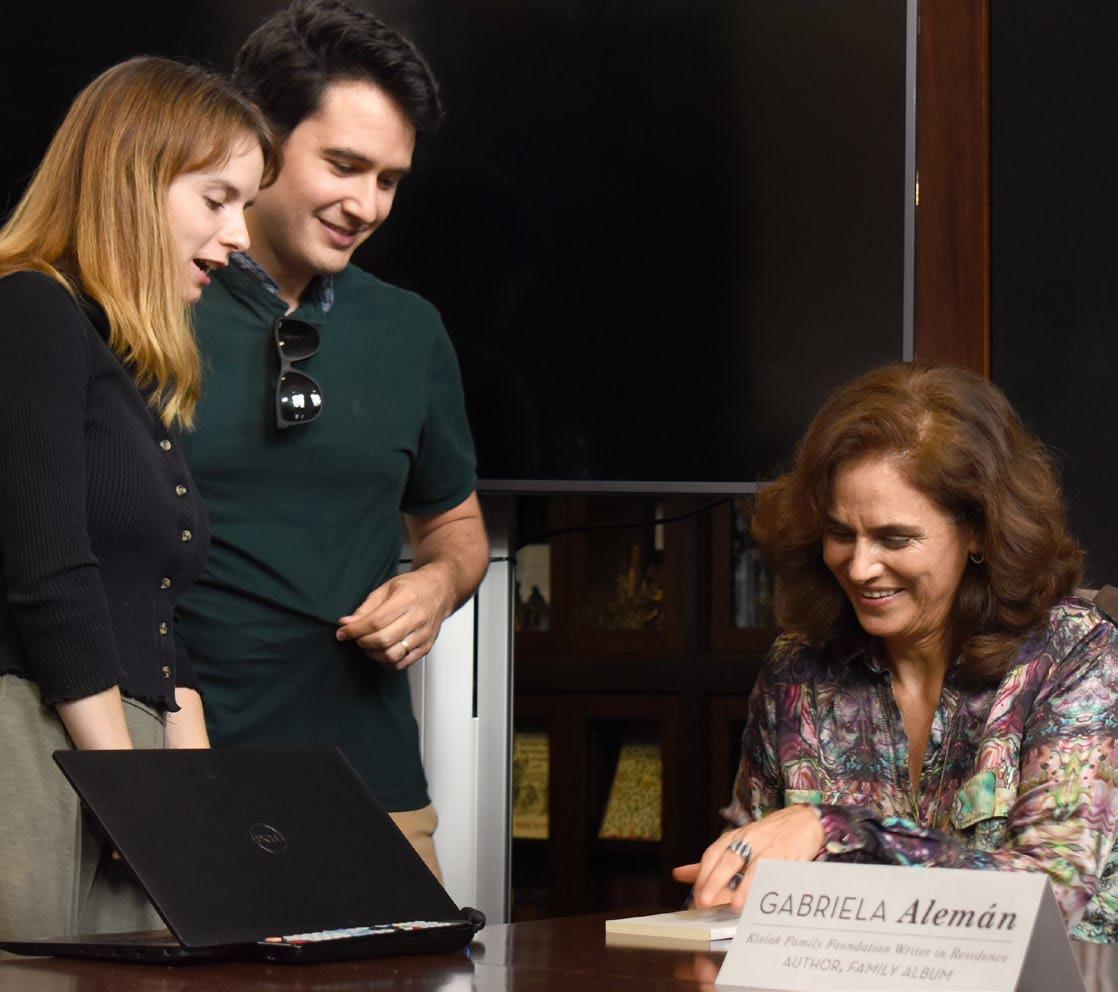
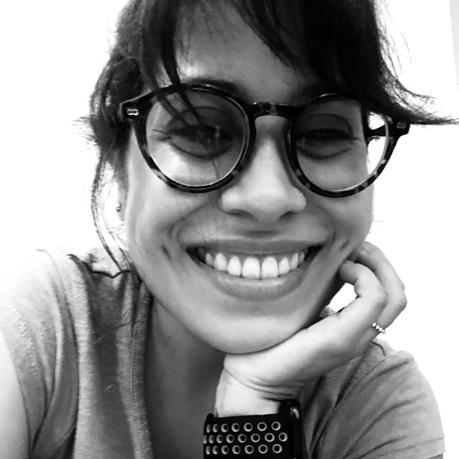
Having a boss called Gabriela Alemán
When Gabriela speaks, so do her eyes. They flicker around the room, constantly breaking eye contact. But her soft-spoken voice does not seem to reflect the nervousness of her eyes. When she is unsure of something, or she is thinking, she presses her lips together and shifts to one side. As I was planning to interview her about the Cinema Ecuador Film Series we would have during the semester, I asked if I could record her. At first, she was hesitant. She thought I was going to do a video recording, which made her nervous. I told her I just wanted to record her voice for a transcription. She agreed. On the day of the interview, there we were, two Spanish speakers exchanging words in English because we wanted to promote the events to a broader UF community. What I did not say is that I too was nervous. Little did I know that in November, at one of the film screenings, Gabriela would enlist me to do a live translation from Spanish to English for director Juliana Khalifé. It was terrifying, but indeed one of the best experiences that I have had.
At Gabriela’s table, there is always room for one more, or two or three. And writing is the meal. Her creative writing class had more “arrimados,” “arroceros,” “colaos” —scroungers—than enrolled students. On the first day, a lot of potential students arrived hoping to get a seat in her class. I was one of them. Without hesitation, she smiled and said, “Of course. But if you are going to be here, you have to do all the activities and attend like any of the enrolled students.”
One day Gabriela arrived at class wearing a skeleton hand. Most of the group thought it was a new type of ergonomic hand “stabilizer.” When some of my classmates asked her what had happened, she just said, “It is a bracelet,” while looking very amused. Two weeks later, at the celebration party for her book launch, Family Album: Short Stories, we talked about the skeleton bracelet again—as she was wearing it that night too— and how some of us were shy about asking what had happened to the hand. We laughed, but then she said: “What I have learned is that you don’t meddle with the woman’s body.”
She furthered her argument by telling us a story about how, once, while doing exercises with a stretching band, it slipped off her feet and hit her face, bruising her right eye. When she was
stable enough to continue doing normal things, she visited some of her regular places, and encountered a few friends. No one asked what had happened to her, or why she had a yellow bruise on her eye. Finally, she asked one of her friends: “Hey, you are my friend. Why didn’t you ask me what had happened to me?”
She shared that her friends thought the wound was something private, related to a boyfriend, and that to ask her about it was to meddle in her business. She told us, the group of students that were listening attentively, that in Ecuador talking about gender violence is still taboo. Although there are still only a few, in Quito some makeup artists used to paint women to cover their bruises. Women continue to feel that they cannot talk about this issue, that they must seem unharmed at all times. No one asks either. Silence keeps on reigning. If we learned anything from the mystery of the skeleton bracelet, it showed us that silence kills. And how to write about silences? Better said, how to write to break silences?
Break it down with language!
Students decided to take Gabriela’s course for different reasons. Some were eager to learn from a Guggenheim scholar and famous author. Others wanted to practice narrative instead of poetry. Some were interested to learn how fiction enriches research work. And some of us considered her class a refuge from the academic load and the anxiety of our final year. But writing has become a way to know each other’s silences. Gabriela’s class is a place where we read, talk, laugh, imitate, and complain about always being hungry. We have talked and
4
“Donde come dos, comen tres,” a Latino proverb
Gabriela Alemán signing a copy of ‘Family Album: Short Stories’ for Alejandro Ramos, a student in her creative writing class
written about architecture, chickens, soup, dance, statues, ham, the city, the countryside, hurricanes, ghosts, gender, race, and violence. We have also written about bridges. Moreover, we have built bridges, and we have built them while writing together, as a community, even if our writing dreams are farfetched, such as saying that any of our works resemble those of Cortázar [the famous Argentinean author who contributed to the ‘Latin American Boom’ in literature in the 1960s and 70s].
But Cortázar is no longer here. Gabriela is. (Pun intended, to our dear classmate Juan Manuel!) Gabriela is a prolific writer, and an erudite scholar. Amongst our group, we are always asking ourselves: how does this woman know so much about different things? That still puzzles me.
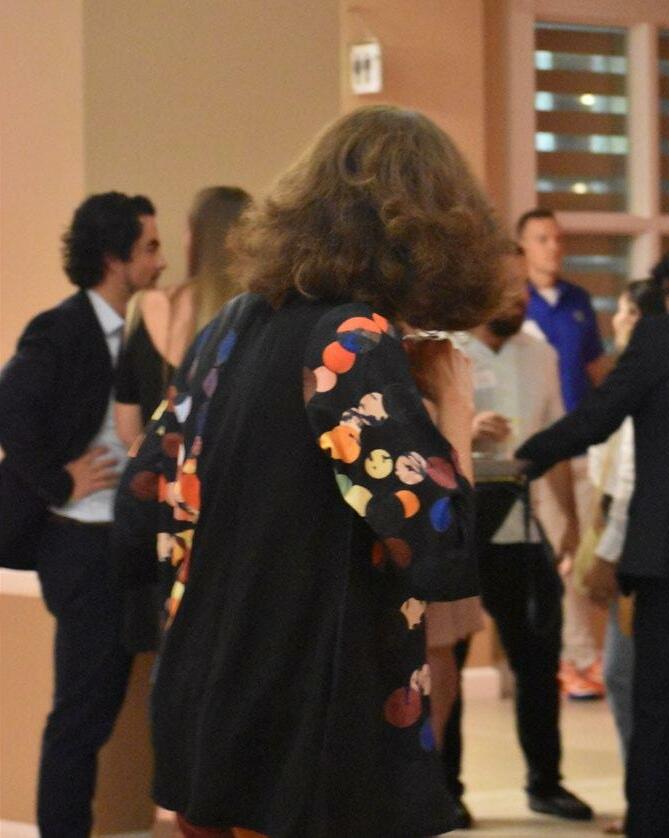
Her creative writing is filled with references from different cultural contexts, as well of anthropology, history, art, and sciences. She has shared with us that before writing she must research as much as she can on a topic, and that sometimes can take a lot of time. Also, she is very drawn to theory that she is able to incorporate into her stories. After that process, she can sit down and write continuously, even more than she expected to, as she did for her novel Poso Wells (2007). But she has always encouraged us to find our own style and process. Gabriela’s second major work translated into English, after her debut Poso Wells, is Family Album: Short Stories (City Lights Publishers), which we celebrated with a book launch in October. Literary scholar Nicolás Campisi (Georgetown University) joined Gabriela for in-depth discussion about the blend of reality and absurdity in her genre-hopping book of stories about Ecuador. When the event finished, nearly every attendee filed into line for an autographed copy.
Literature is meant to be shared Gabriela’s vibrance comes through in her sweet smile – and her dance moves! She is passionate about soccer (a trait we witnessed during the World Cup), and happiness seems to flood her personality, as well as her solidarity. Not only had
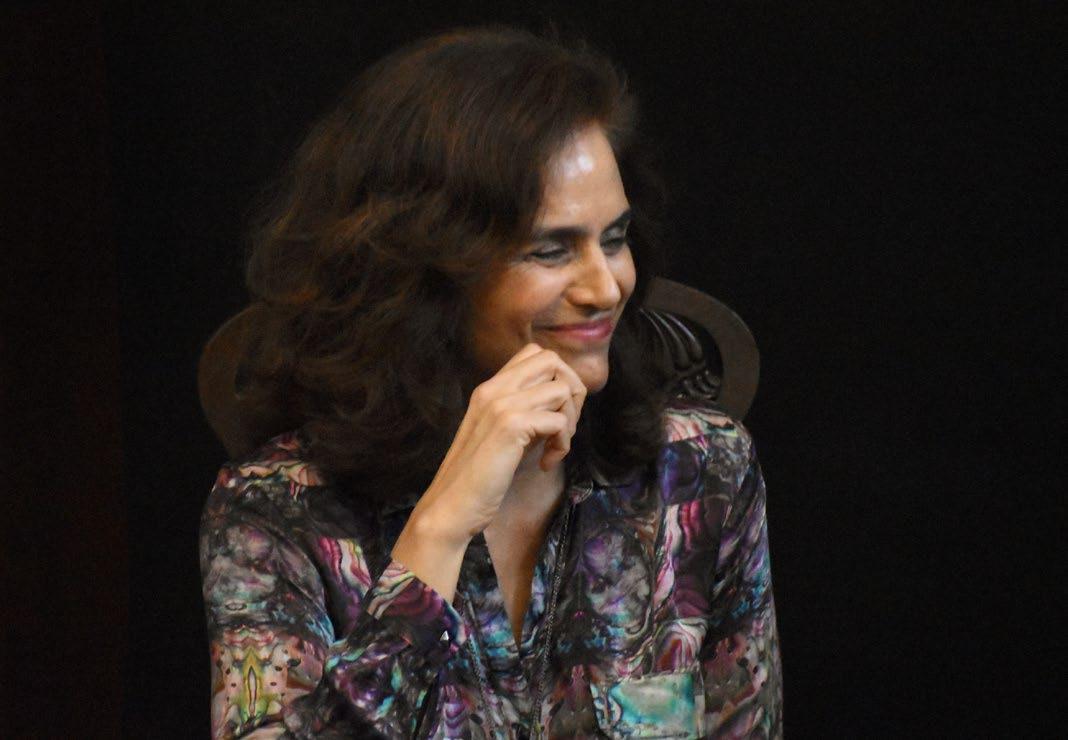
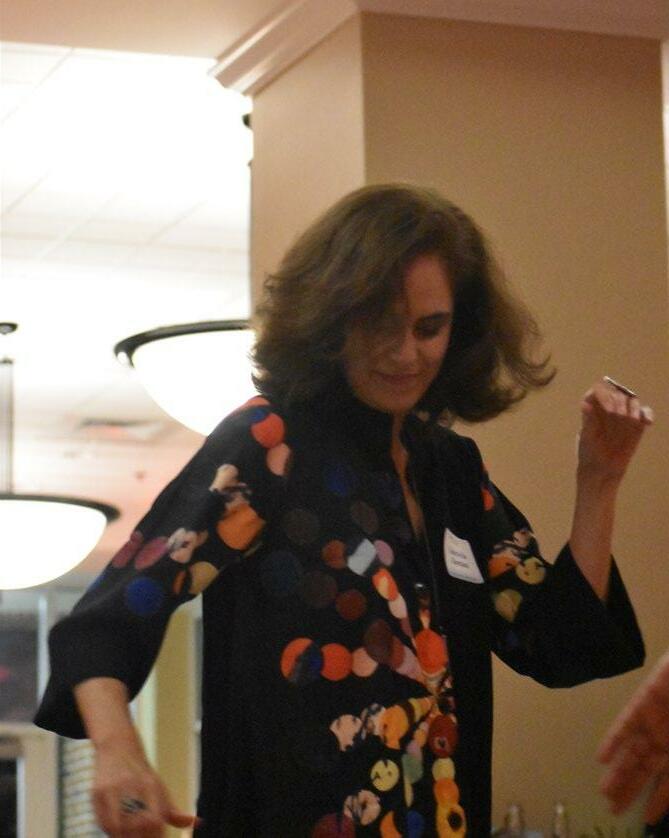
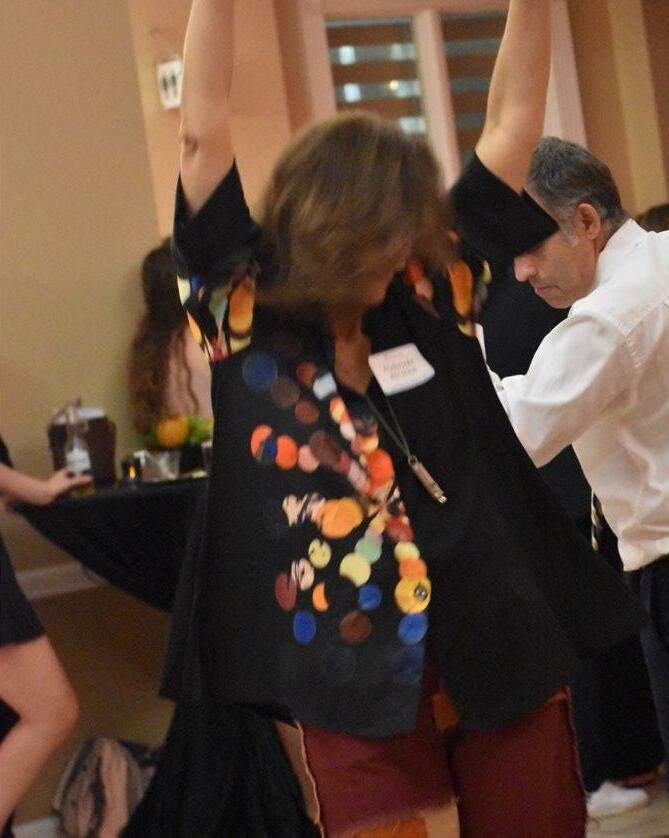
she designed a writing class that showed us the diversity of Latin American writers and topics, she also granted us the experience of “reading” her, as an author and as a person. During the semester she gifted us some of her books without expecting anything in exchange. In the same way that we attended her faculty “Coloquio” this fall semester, she also supported us in our student “Coloquio” presentation. Not only was she present, she shared words of encouragement, and fruitful commentaries.
Gabriela is a perpetual student, and intellectual—not to be confused with education level only—who does not seek the spotlight, is eager to share what she has and what she knows. For the aspiring writer like myself, and many of our classmates, Gabriela assembled a digital volume with some our works. [You can read a few examples on pages 8-10.] This type of motivation is deeply needed when emerging writers are finding their voice, and building confidence on their talents. As the semester has ended, she is getting ready to leave Gainesville, and she will be deeply missed. It is true, we tried to do some informal advocacy for her stay, but we must share her with future students, as she has done with herself and her talent. She must keep on dancing. ◆
FEATURED STORY
Gabriela Alemán dancing at the Center’s Annual Reception, November 2022. All photos by Maricarmen Torres Medina.
Cusco study abroad program bridges health and culture with community immersion experiences
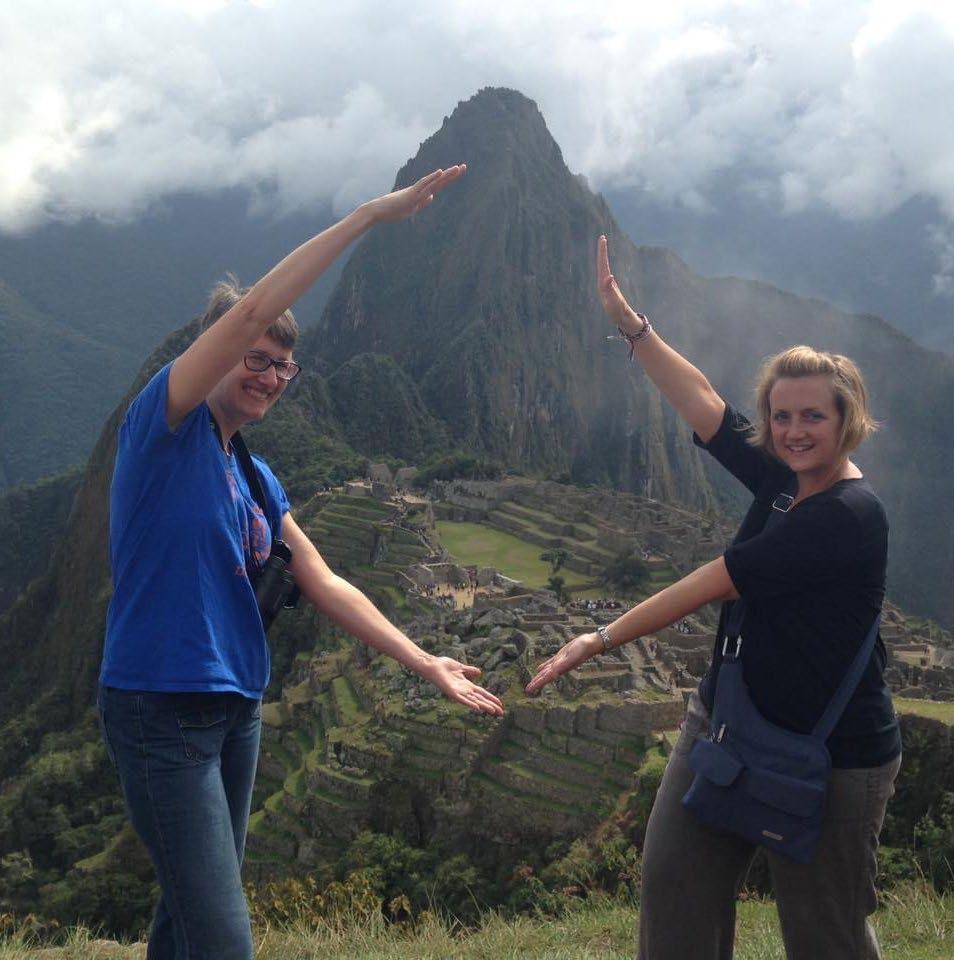
Spanish and Biology professors interweave curricula that promotes curiosity and reflection, cultural competency in Latin America
When most U.S. students imagine a popular study abroad destination, Peru might not immediately come to mind – and if it does, it likely conjures study of archaeology, culture, and history, thanks to the legacy of the Inca civilization surrounding Cusco. But UF’s International Center (UFIC) offers a more unique itinerary: a Cusco program for pre-health students that intertwines topics of public health, Spanish language, and Peruvian culture to foster an immersive, hands-on learning experience.
In the summer of 2022, Biology professor (now UFIC Dean) Dr. Marta Wayne and Spanish professor Dr. Paola Uparela, both Center affiliates, served as the faculty leaders for the program. While the professors rotate each year, the interdisciplinary element of the program remains crucial. “We try to design projects that overlap and interlace in some manner,” says Dr. Wayne. “There are all kinds of opportunities to broaden the biology into the cultural, and that added dimension helps enrich the experience.”
The UF in Cusco program was originally drawn up by former chair of Spanish and Portuguese Studies Dr. Gillian Lord and Dr. Wayne herself. It is designed for pre-health students with the goal of developing cultural competency with Latin America as well as increasing the number of the Spanish-speaking and Latin American applicants to the program.
Over the course of six weeks, students stay with host families, volunteer at local clinics, and meet for classes in Spanish and Biology. The immersion in daily life is essential for a sincere cultural experience, says Dr. Wayne. “The fact that the students are staying with host families is key, because it’s very different than if they were staying in a hotel. They are experiencing the culture in a much more intimate way.”
Of course, this means they’re also practicing the language. “Spanish acquisition is such an important part of the program, too,” Dr. Wayne adds. “Speaking another language just
completely changes the way you see a place, when you can actually talk to someone in their language and – hopefully –understand what they’re saying back to you.”
On weekends, the group takes excursions to learn more about the culture and history of Peru. The 2022 program visited the Inca archaeological site of Machu Picchu and the floating islands of Uros in Lake Titicaca, and took classes in cooking, basic Quechua, traditional weaving, and alternative medicine practices. While the iconic Machu Picchu is a must-see, often students are equally amazed by a less famous site like Lake Titicaca, where they can interact with local people and learn how they construct their floating islands from reeds.
During the week, immersion in both domestic and professional spheres offered students the opportunity for perhaps the most fundamental components of their learning: curiosity, observation, and reflection. Students were required to keep a journal – in Spanish – to record their experiences and perspectives. They were also encouraged to ask questions of their host families around the dinner table to better understand daily life and cultural customs in Cusco. They would then bring these conversations to their classes and discuss the similarities and differences between U.S. and Peruvian cultures. For a program designed for the health professions, this meant questions about attitudes toward vaccinations, or how they treat their produce.
Students also made observations about their clinic experiences in Peru compared to those of the U.S. These topics can be complicated and enriching to explore. “I was amazed to see just how different the healthcare system is there compared to the U.S.,” says student Matthew Henriques. “Something as simple as being able to make an appointment to see a physician wasn’t commonplace in Cusco. Mental health services in the treatment of something like alcoholism were virtually nonexistent, whereas intervention services here in the States are frequently pushed for.”
6
“At first the students are struck by things like a lot of the clinics not having sufficient protective supplies like gloves,” Dr. Wayne adds. “But then they start picking up on other things like the doctors having time to talk to the patients. We dissect these observations in class and incorporate the perspectives from the host families, and you can really see students thinking deeply about this.”
“I knew prior to leaving for the program that healthcare systems around the world vary greatly,” Matthew reflects. “But, to see it in person did two things for me: one, it made me more thankful for the healthcare system we have in place in the U.S., and two, it reminded me that as a future physician, I need to be more mindful of the backgrounds of my future patients. I can’t assume that everyone has the same predispositions and expectations for the care they’re anticipating from me, and I need to be aware of the fact that an approach to caring for a patient varies with each individual.”
For the 2022 program participants, the public health atmosphere in Peru was still strongly informed by the COVID-19 pandemic, from which the country has suffered the highest number of reported deaths per capita in the world. “We would go outside and most people were wearing masks, even outdoors,” Dr. Wayne shares. “To go in the bank, you had to show a vaccination card. If you went in the grocery store, they sprayed your hands with disinfectant. It’s just not like Florida at all, and I think that stark contrast was a big ‘aha’ moment for students.”
Ultimately, the opportunity to experience and learn from cultural differences is the value of study abroad at its most essential – and most powerful. “The most important part of travel in general, and study abroad in particular, is that you can see other cultures and then understand your own culture better,” Dr. Wayne reflects. “A lot of things are different – not necessarily better, not necessarily worse. But through that exposure we start to understand alternatives, and that shifts our perspectives about ourselves. To me, study abroad is about creating globally informed citizens who are ready to take charge of the future and see how things could be.”
Student Daisy Facio-Aguiniga once wondered if her peers were exaggerating when they talked about their “life-changing” study abroad experiences. But after her time in Cusco with UF, she says it was the greatest experience she’s had in undergrad by far. “A program that initially offered me the opportunity to learn about infectious diseases, practice Spanish, and volunteer at a local health center came to present me with a new side to world history, a new perspective on my Latinx culture, and a new want to immerse myself again in a culture upon having returned to the United States.” ◆
Applications for the Summer A 2023 UF in Cusco program are currently open. The Biology professor will be Dr. José Miguel Ponciano and the Spanish professor Dr. John Flanagan. Scholarships are available through the International Center. Learn more at: ufic.ufl.edu
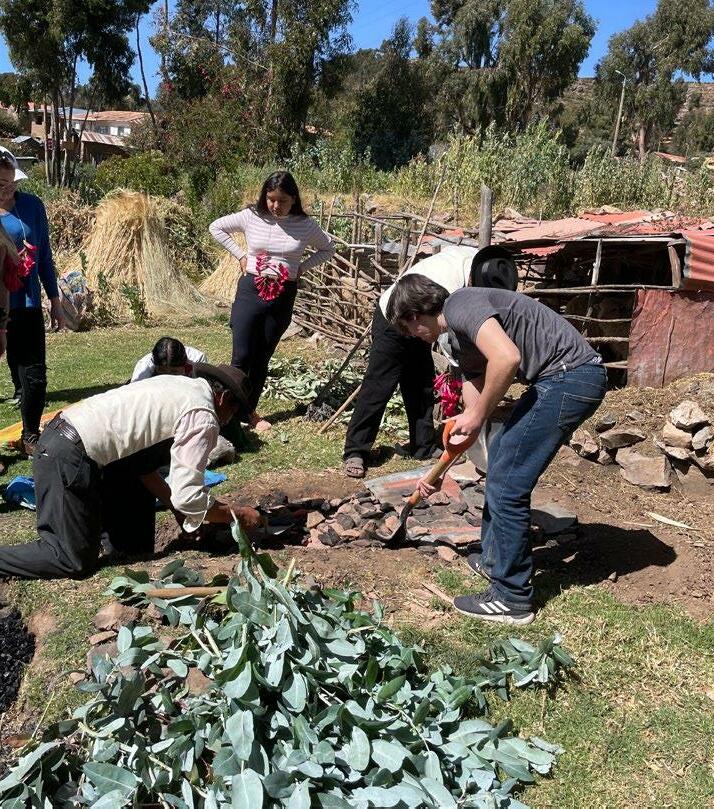
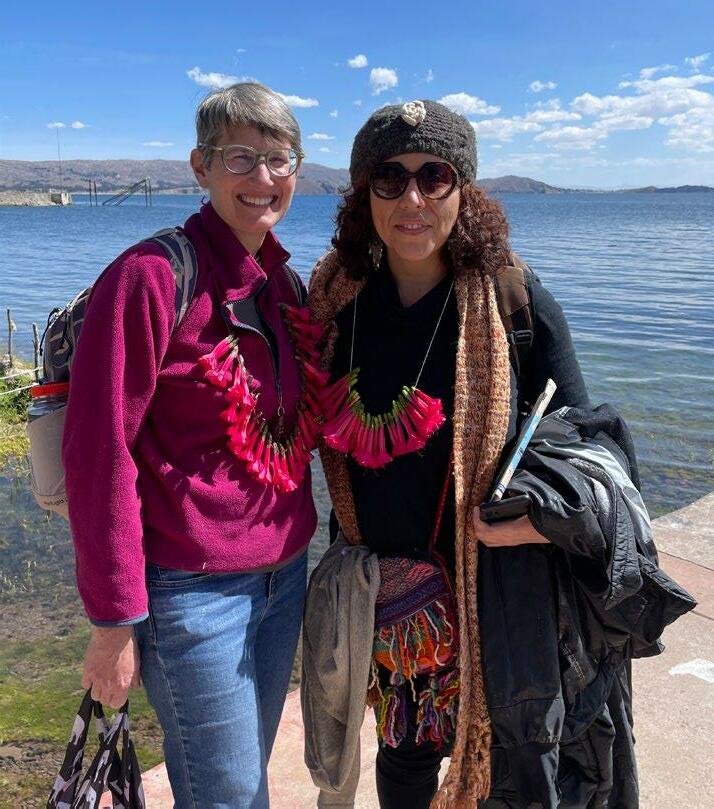
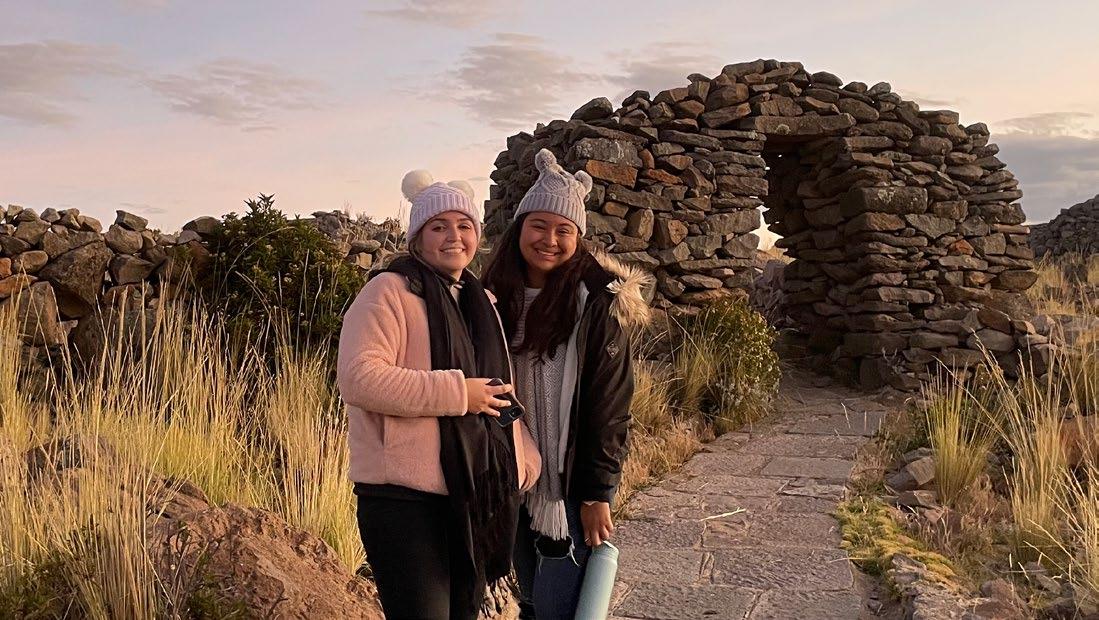
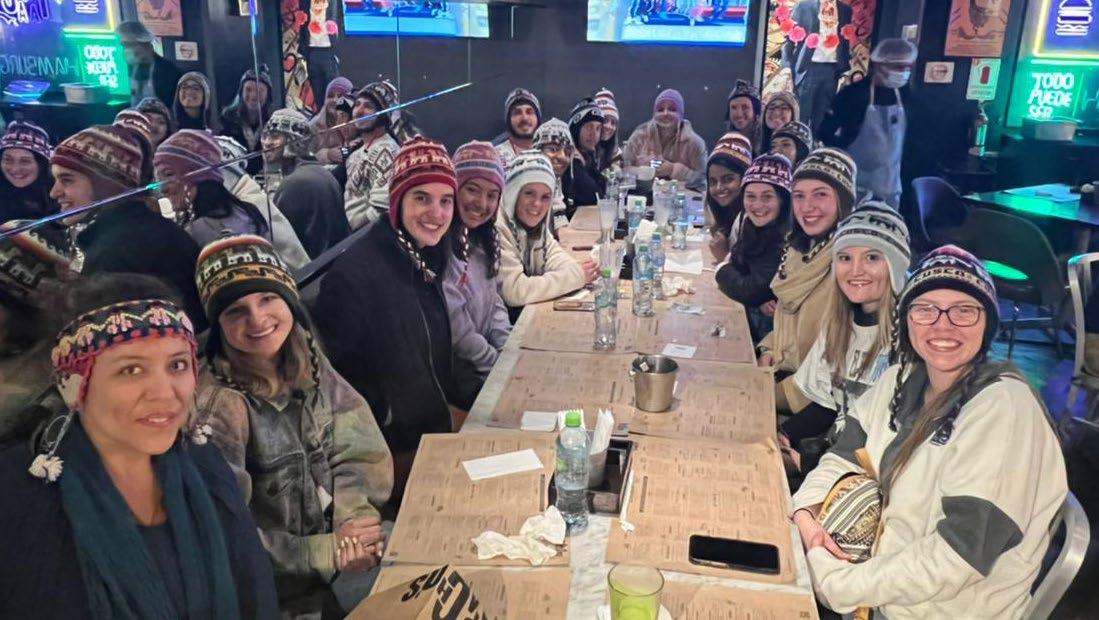

7 FEATURED STORY
Featured STUDENT WORK
Toma agua ocho veces al día
Esa mañana llegué tarde a mi turno en la oficina. Me desperté sin ganas de salir de la cama y, para colmo, estábamos a treinta y cinco grados centígrados.
Desde hace tres días tengo un dolor de cabeza extraño, me duelen los ojos y me laten los lóbulos parietales, pero no es un dolor agudo. En una escala del uno al diez el dolor está en cuatro. Odio el calor, no puedo respirar y puede que todo esté en mi cabeza, pero este clima horripilante hace que sienta mucho más el dolor. Esa mañana, mientras me aproximaba a la parada de bus, la mirada se me nubló y mis labios se empezaron a secar. ¿Será COVID?, pensé. Ahora todo es ese odioso virus.
—¿Recibiste mi correo? El viernes llegó un paquete para ti—me dijo Cristina apenas me vio llegar a la oficina.
Qué raro, pensé, nunca me había llegado un paquete al Centro. Los únicos que tienen la dirección de mi facultad son los del seguro de salud.
—Gracias Cristina. ¿Sabes quién lo entregó? Porque no sé quién es el remitente...
Me encanta recibir paquetes. Me hacen sentir una persona especial. Alguien tan importante como para enviarle un paquete. Me imagino que así se deben sentir quienes viven en Esmeraldas cada vez que les llega una encomienda. En Quito nunca he recibido un paquete y como en Estados Unidos todo se envía por paquetería, ahora pido hasta un par de aretes con tal de recibir el correo: —Hello Whitney, we have a package for you—me dicen desde la oficina central del edificio donde vivo.
El paquete era una caja de cartón de tamaño mediano. Era pesada y estaba húmeda. El remitente era un número: 20091995. No tenía ciudad o país de origen. Lo primero que se me ocurrió fue que podía ser un paquete de la clínica de la universidad, pero no había recibido ningún e-mail de parte de ellos. No estaba segura si el número era un código postal,
o un número de teléfono, o un número de serie. Pensé que era muy extraño porque en gringolandia se toman muy en serio esto de las direcciones cuando de paquetes se trata, pero este lugar sigue siendo muy nuevo para mí y supuse que era válido enviar cajas húmedas sin lugar de procedencia. Cuando la asenté sobre mi escritorio sentí que algo rodó dentro. Abrí el primer cajón y sin mirar dónde estaba lo que buscaba, hurgué entre todas las chucherías que había, pero no lo encontré.
—¡Cristina! ¿Tienes un estilete que me prestes?
—Claro, te lo llevo a tu escritorio. Cristina lo dejó sobre el counter de mi escritorio y regresó a su oficina. Traspasé la cinta adhesiva con la punta del estilete sin darme cuenta de que corrí demasiado la navaja.
—¡Au, MIERDA!— gritó algo dentro de la caja.
Del susto lancé el estilete hacia atrás sobre mi hombro derecho y vi mi cabeza dentro del cartón.
—¡Dios! ¿Estás bien? ¿Te cortaste?— me preguntó Cristina mientras caminaba hacia mi escritorio.
—¡No vengas! Digo… no te preocupes, estoy bien. Solo que no me fijé en lo que estaba haciendo y me corté un poquito el dedo— le dije temblando y chupándome el pulgar derecho para que creyera que me había cortado.
Cuando Cristina se dio la vuelta abrí de nuevo la caja y ahí estaba: yo. Se veía como yo misma hace un par de años atrás, como me veía ese lunes de feriado en el que me di tremenda batida en la bicicleta y terminé con la cara hecha leña, justo quince días antes de mi cumpleaños número 27. Como le corté la frente por accidente le chorreaba sangre por todo el rostro y sollozaba. Faltaban diez minutos para que llegara el director del programa y yo no sabía qué hacer con lo que había recibido. Cerré la caja y agarré alcohol, algodón y una bandita que encontré en
el botiquín que armamos hace un mes y me llevé la caja al baño. Ya encerrada ahí dentro la limpié y le puse la curita. Seguía sollozando y lo que se me ocurrió fue darle un besito en la frente para que se calmara. Al fin y al cabo era yo misma. Ya me había olvidado cuán bonita era por esas épocas. Hasta me la habían enviado con los lentes que solía usar por esos tiempos, los grandes con el marco púrpura; pero si yo era un bizcocho... Más que asustarme me conmovió ver la cabeza de la que yo era hace un par de años, creo que porque había pasado ya mucho tiempo y no recordaba cuán feliz era, o solía ser. Sus labios estaban resecos, como los de una persona muerta, pero parecía respirar muy suavecito, como si estuviera en agonía. Seguía sangrando y ahí fue que me di cuenta que me la arrancaron. La saqué de la caja y al lavarle el rostro abrió los ojos y dio un respiro, como de alivio. Ahora entiendo por qué mi pareja me decía que era una cabezona. Realmente tenía una cabeza grande y vaya que pesaba. Cuando me miró, su semblante cambió y pareció estar feliz. Sus labios se tornaron rojos, ya no parecían labios de muerta y después de unos cinco minutos en el agua me dijo: —¡Hola! Tu yo de hace dos años, quien estuvo en el hospital por quince días, por deshidratación severa, me envió hasta este tiempo para recordarte que debes tomar agua. Esta es tu última oportunidad para corregir ese defecto tuyo, pero como es tu última oportunidad debes tomar agua por mi y por ti. Lo que significa que si no me das agua ocho veces al día me secaré y moriré, pero si tú no tomas agua ocho veces al día nos moriremos las dos.
Cada vez que les cuento esta historia a mis abuelitas me regañan porque se suponía que viviría 200 años, como las tortugas, pero lo que pasó es que ese día olvidé mi termo y ninguna de las dos llegamos vivas al fin del día.
Lo cool de todo esto es que el alma de mi cabeza también está aquí conmigo y mis abuelas. ◆
8
The following creative works are authored by students in Gabriela Alemán’s class, “Latin American Short Stories and Creative Writing.”
WHITNEY D. RODRÍGUEZ (MALAS 2023 )
Fresas azucaradas
PATRICK L. GREY
Pasé por la sección de alimentos congelados en el supermercado. Había trabajado desde las ocho de la mañana y solo quería comprarme un helado de fresa. No quería el de chocolate porque era demasiado pesado, tampoco quería el de vainilla porque era demasiado soso, solo el de fresa me iba a satisfacer. Mientras caminaba por el pasillo de congeladores con mi coche, la piel se me erizaba, las mejillas se me sonrojaban, y mis piernas temblaban. El frío siempre me molesta, es por eso por lo que siempre ando con un suéter. Esa noche tenía mi capucha sobre mis rizos despeinados, escuchaba una canción de Maluma en mis audífonos, y, como dejé mis lentes en casa, tuve que buscar mi bendito helado de fresa a ciegas. Mientras me esforzaba por ver los recipientes, la vi en mi periferia. Mi mamá estaba en el mismo pasillo donde yo estaba. Tenía puesto un jean y una blusa roja. No pude verla en detalle, tal vez se pintó sus canas, o aún usaba el mismo collar de oro con la imagen de la virgen, o tal vez por fin tiró su anillo de matrimonio. Pero supe que era ella. Pude oler su perfume desde donde estaba. Aún olía dulce cómo una torta recién hecha, pero su perfume también era fuerte cómo una leona protegiendo a sus cachorros. Me detuve donde estaba, probablemente me veía transparente, como si hubiera visto un fantasma. Y, en mi mente, también quise que ella estuviera mirándome. Ya pasaron tres años desde la última vez
El maratonista
KRISTINE K. VILLARROEL
Douglas siempre llora cuando se emborracha. Mi papá se burla de él por ser un borracho llorón, pero hasta dentro de chistes lo abraza como a un hermano. Él no era así, al menos no cuando conoció a mi papá. En su juventud solía ser el último en apagarse en las fiestas, el último sobreviviente de las madrugadas cuando el licor llovía, el que se quedaba a ver el sol cuando otros ya le ponían punto final a su noche. Todavía lo era, de cierta manera, pero sus lágrimas apagaban la embriaguez y sus palabras arrastradas opacaban la salsa vieja que escuchaban ya a esas horas de la junta. Cuando comenzaba a llorar y a
que la vi. Cuando ella me amaba, todo era mucho más fácil. Yo era su único hijo. Era su sol y sus estrellas cuando ella me amaba y ella era mi escudo contra la maldad del mundo. Era la única persona que nunca se iba. Era mi mejor amiga. Mi papá no era bueno con ella. En ese entonces, vivía en una casa cubierta de gritos donde llovían vidrios rotos. Mis memorias del zoológico, de los bisabuelos, de mi primer día de escuela quedaban regadas por el piso. Fotos de rojo y fotos de gris, fotos de mi amada familia. Solía recogerlas y guardarlas debajo de mi cama. Aprendí el arte de desaparecer para que no me pudieran ver arrodillado, recogiendo nuestras memorias mientras se lanzaban palabras de destrucción masiva. Después de que el polvo se asentaba, mi mamá siempre me encontraba en mi cuarto tomando refugio. Me daba fresas azucaradas, como si las fresas ya no fueran suficientemente dulces. Las fresas me decían “te amo” sin palabras y el azúcar me pedía perdón sin una voz. Cuando me abrazaba podía oler el perfume que tenía puesto y podía sentir su collar frío presionado contra mi mejilla. Podía sentir paz. El calor de su abrazo me hacía olvidar la tormenta en la casa. Al sentir sus manos en mi espalda, me olvidaba de guerras o de ultra-violencia. Era amor sin condiciones. Ella prometió que las peleas cesarían. Pero promesas de paz son promesas frías. Después de la guerra, las cervezas se vaciaban. Mi papá siempre quería saber lo que había en el fondo de la botella. Él se iba y regresaba, nunca se rindió ni buscó una tregua. Hasta que un día no volvió.
Los veranos se acabaron y los inviernos amanecieron, pero yo era el mismo. Maté al niño y dejé que el hombre floreciera. Mi mamá reconstruyó su vida conmigo. Siempre era una leona feroz. El amor que quedó después de que mi papá se fue era dulce y agrio, como una fresa prematura. Ella se resistía a mostrar su afecto porque descubrió que me transformé en un hombre que se parecía mucho a mi padre. Soy un retrato de mi papá, y era un recuerdo doloroso que le hacía pensar en todas las guerras del pasado. Conocí al amor de mi vida cuando tuve diecisiete años, después conocí a otro, y a otro. De cualquier manera, mi mamá me enseñó a amar en mi niñez. Me prometí a mí mismo que encontraría a un novio que no querría empezar guerras. Promesas de amor eran promesas cumplidas. Se la presenté a uno de mis tantos novios, se llamaba Jacobo y me daba el calor que tanto me faltaba, al menos por ese momento. Nos miró como si fuéramos dos moscas zumbando sobre una fruta. Sin ninguna palabra, sin guerras, ella se retiró a su cuarto. El rechazo de una madre puede congelar el mundo. El día siguiente, se fue y nunca regresó.
La temporada de fresas terminó, pero me aclimaté al invierno interminable. Mientras la miraba del otro lado del pasillo de refrigeración, solo deseé que ella parara justo frente a mí y que dijera “siempre te amaré”. Entre las pizzas congeladas y los helados quise sentir el mismo calor que sentía cuando ella me amaba. Encontró lo que estaba buscando y desapareció en la multitud. Yo seguí parado ahí, congelándome. ◆
abrazar a todos, hasta a los desconocidos, era la señal de que era hora de irse a casa. Mi papá lo llama “la hora del te quiero,” y no es exclusiva a Douglas, pero él verdaderamente le hace honor al nombre.
Los discursos siempre son los mismos, y después de que lo escuchas una vez, ya sabes de que tratan todos. Hablan mucho sobre la gratitud que siente hacia sus panas, sus compadres, a los que siempre llamaba familia. Douglas comenzaba hablando sobre la suerte que había tenido con su gente, y poco a poco iba soltando más y más detalles sobre sus emociones, como dándole contexto a aquellos que lo escuchaban, a gusto o no.
“Son lo único que tengo,” me dijo en uno de esos momentos. Pensé que lo decía por
decir esas cosas que todos los borrachos dicen cuando hablan de la gente que aman, pero Douglas lo decía en serio. Hace solo un par de meses había llegado a nuestro sofá con solamente un bolso y un par de camisas. Antes de su residencia en nuestra sala, había llegado a Miami con su mujer, pero después de un par de semanas viviendo en la calle a falta de lugar donde quedarse, ella vendió su teléfono para comprarse un boleto de vuelta a Colombia, a donde la pareja había migrado desde Venezuela hace unos diez años con sus hijos pequeños. Vinieron a pie desde Colombia a Texas. Como a tantos otros migrantes, fue la frustración con el crimen y la violencia y la política sucia que los sacó de donde estaban y CONT’D >
9
Featured STUDENT WORK
< CONT’D los mandó a seguir el faro del sueño americano al otro lado de la frontera.
Me sorprendía escuchar sobre su travesía, aunque no fuera rara en estos tiempos. Miles de kilómetros recorridos a pie suenan como un reto imposible de completar, pero Douglas, como muchos otros, los recorrieron y viven para contarlo. Todas las mañanas temprano, antes de que salga el sol, él sale a correr. Al principio pensé que le daba una vuelta a la cuadra y volvía, pero se trataban de carreras de docenas de kilómetros todos los días, y aun así volvía con todos los ánimos de ir al gimnasio con mi hermanito. Dentro de lo poco que llegué a conocer a Douglas, lo que sobresalía era su ánimo y su carisma. Una sonrisa más alegre que todas las otras que he visto, y un entusiasmo que vuelve
imposible saber si tiene quince o cincuenta años. A veces me contaba sobre sus vidas pasadas. En una, era un electricista; en otra, un ingeniero en la compañía eléctrica de Colombia, y, en mi favorita, era un maratonista olímpico que había recorrido la mitad del mundo representando a la bandera tricolor. Contaba cuentos de hoteles elegantes y convenciones de ejecutivos con corbatas y de montañas nórdicas y ciudades antiguas, pero aun así le parecía más impresionante ver ardillas en un parque que recordar aquellos tiempos. Es más, casi no lo mencionaba. La primera vez que me enteré de aquella vida pasada fue mientras le contaba sobre el sistema de bus de Miami y me dijo que cuando había visitado los países del norte de Europa había ido en tren a muchos lugares. Era bueno, me contó. Corría como
nadie más y por muchos años vivió con el sueño olímpico de recorrer el mundo y ser galardonado por sus habilidades físicas. Y ahora vivía en nuestro sofá, el cual le era muy cómodo luego de haber dormido en peores lugares. Sin carro o teléfono y viviendo en una ciudad construida sobre gasolina e internet, Douglas solo tenía sus pies ¡y como corría!
La última vez que hablamos ya no vivía en nuestro sofá. Consiguió una renta barata en algún lugar donde el bus llegaba a recogerlo y a llevarlo al trabajo que había conseguido instalando techos en casas recién construidas. Me contó que había ahorrado suficiente dinero para comprar unos tenis Jordan para su hija y para mandarlos a Colombia. Ella también corre, aunque sea del otro lado del Caribe. ◆
Center events AT A GLANCE
Watch past events on YouTube at bit.ly/3Er8b18 or use the QR code!
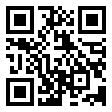
FALL 2022
• Individual Sovereignism & Conspiracy. How Populist Rhetoric Hijacks the Rule of Law in Pandemic Times Oscar Mazzoleni˚ [9]
• Building the future: Infrastructure and environmental justice in Paraguay’s Chaco COLOQUIO with Joel Correia*
• Cinema Ecuador Film Series Ratas, Ratones, y Rateros
• Race, Environment, Culture, and Political Ecology across the Americas by University Press of Florida, ft. Joel Correia*
• Beyond symbolic? Gustavo Petro, Francia Márquez, and the new policy of inclusion in Colombia Weildler Guerra Curvelo˚, Juan Carlos Moreno Perea†, Donovan Carter†, Juliana Restrepo*, Oyuela Caicedo*, Paola Uparela* [1]
• Diasporic Perspectives on The Black Radical Educative Tradition COLOQUIO with Christopher Busey* [8]
• Cinema Ecuador Film Series Con mi corazón en Yambo
• Caribbean Crossroads: Race, Identity, and Freedom Struggles by University of Florida Press, ft. Lillian Guerra*
• Family Album: Short Stories by Gabriela Alemán book launch with Nicolás Campisi˚[2]
• Cinema Ecuador Film Series La importancia de llamarse Satya Bicknell Rothon
• La lengua enfebrecida: una ‘autobiografía’ del artista George Febres. An exploration of language and place in Jest for the Pun of It COLOQUIO with Gabriela Alemán* [3]
• World Music Fest ft. Jacaré Brazil and Jacaré Brazil Independence Concert ft. Welson Tremura*, Daniel Sarkela† [11]
• Retos y perspectivas del pueblo Maya Irene Yolanda Aké Ché˚ [4]
• Annual Reception with Association of Hispanic Alumni [5, 6]
• Cinema Ecuador Film Series Sumergible [7]
• Putting Photography on the Spot: MALAS students’ insights and experiences from the photographic field Francisco Sánchez†, Maricarmen Torres Medina†, Kleber Naula† [12]
• Back to Normal? Brazil after the 2022 elections Anthony Pereira˚ [10]
˚Guest speaker from outside institution † Center student *Center faculty (Core, affiliate, or visiting scholar)
10
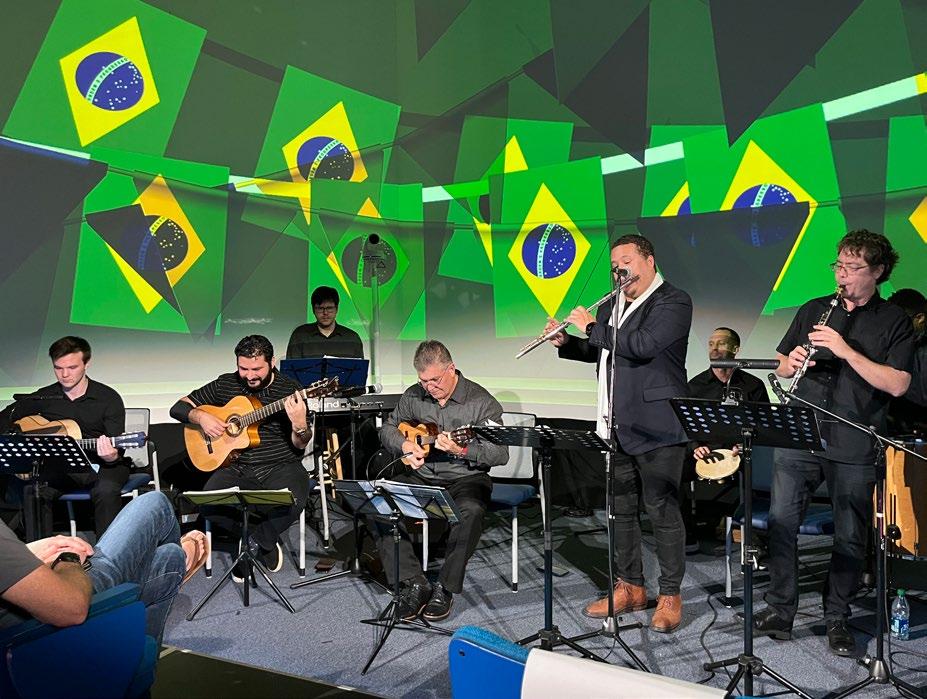
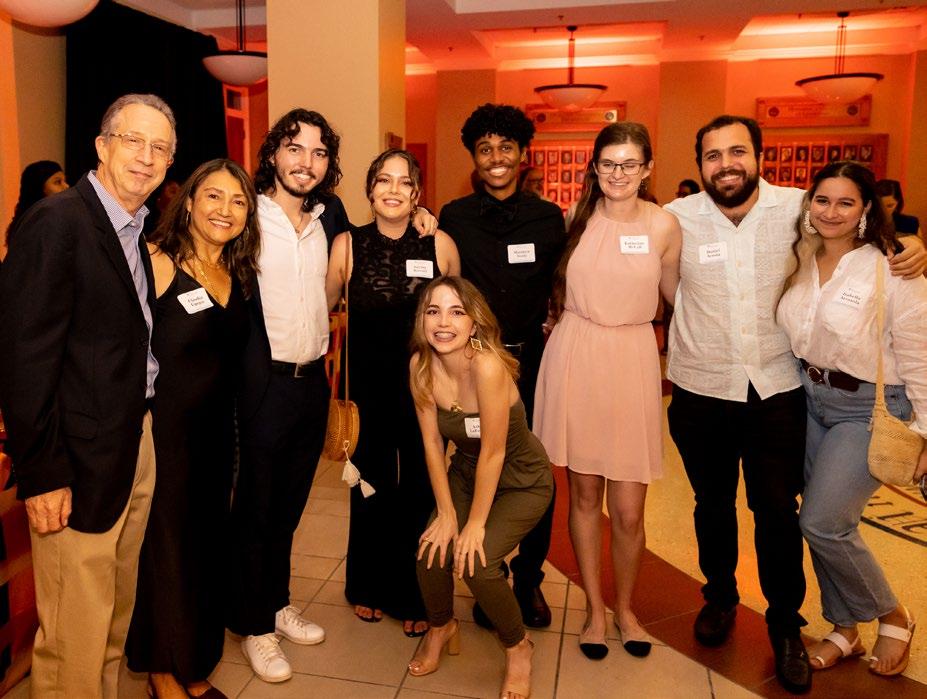
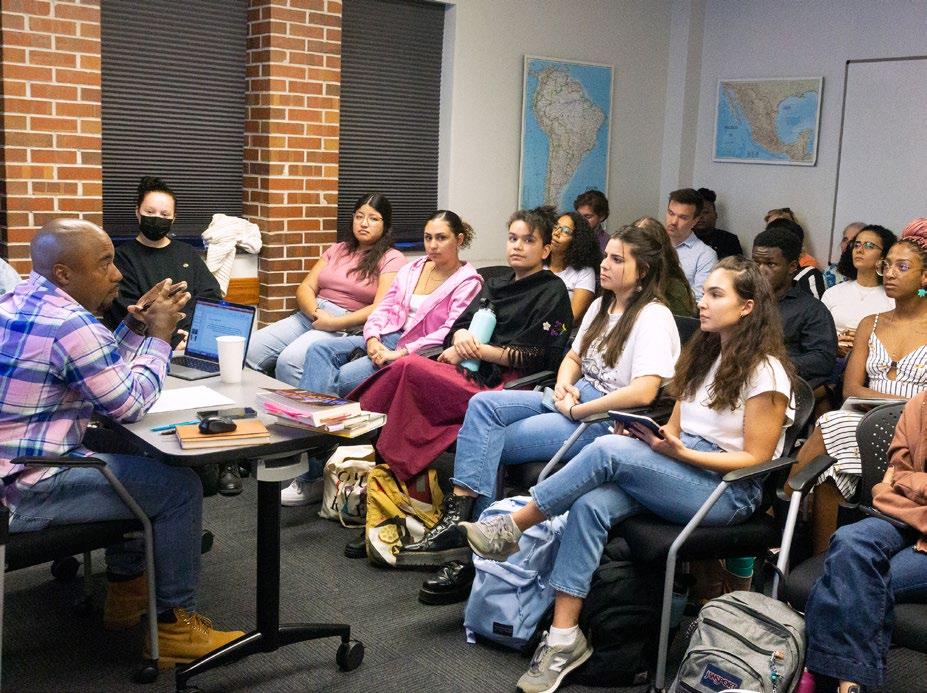
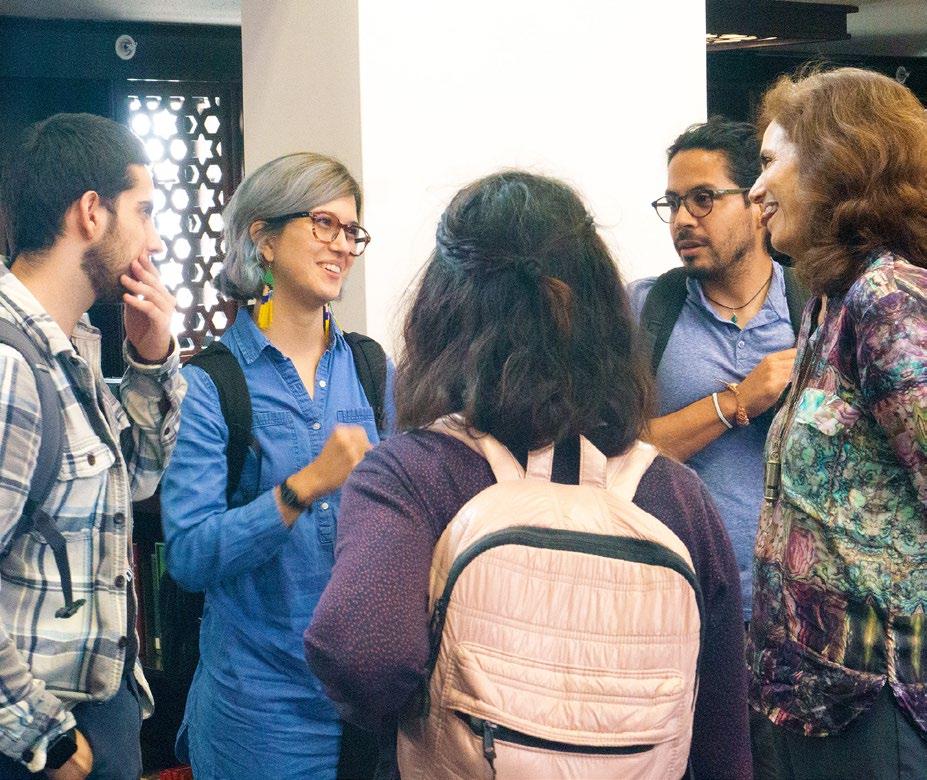
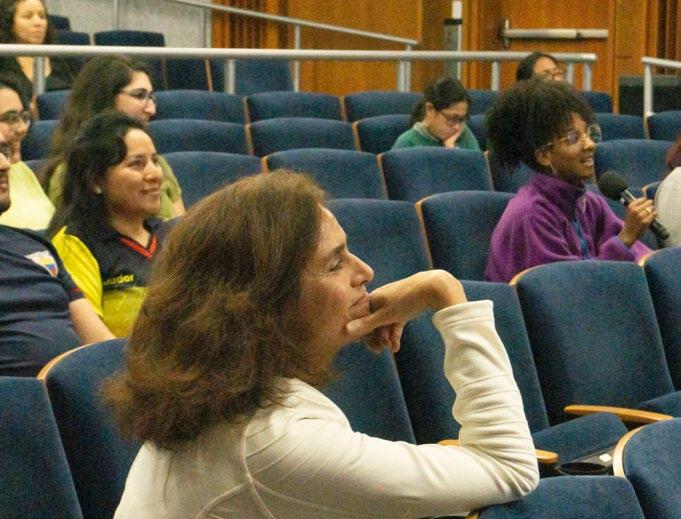
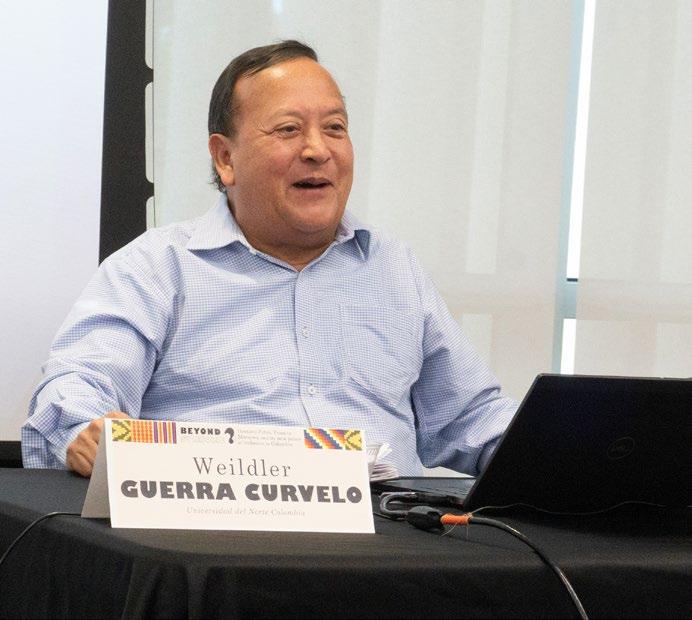
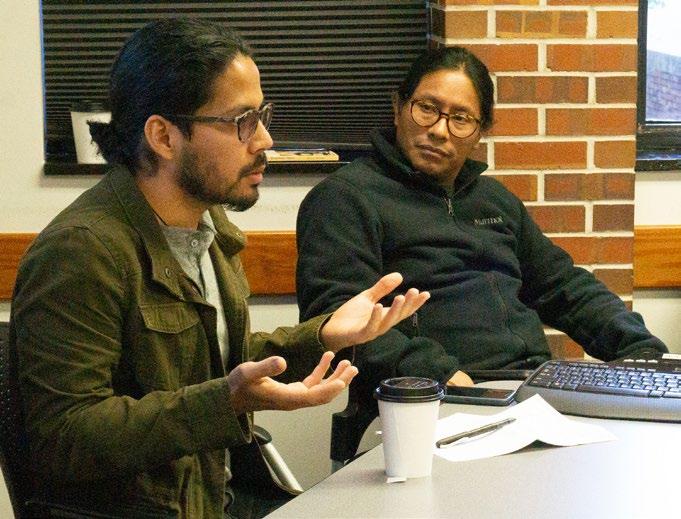
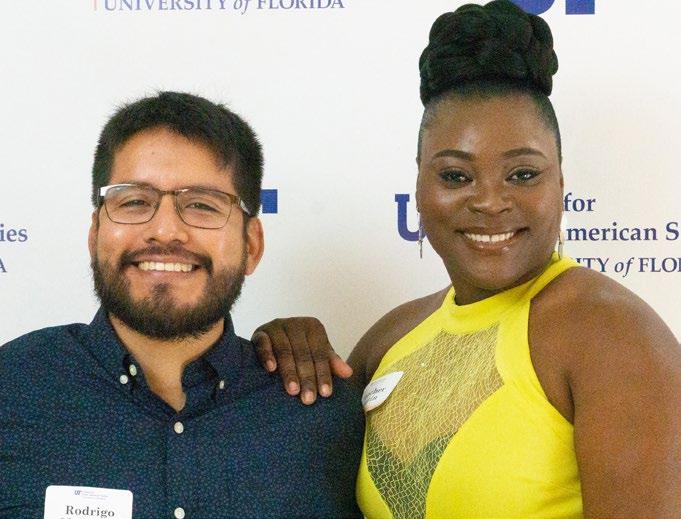
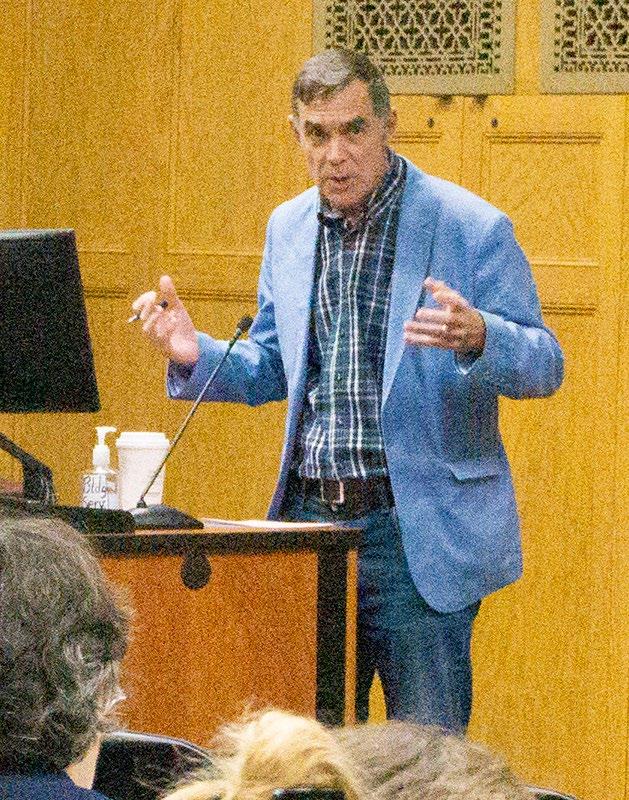
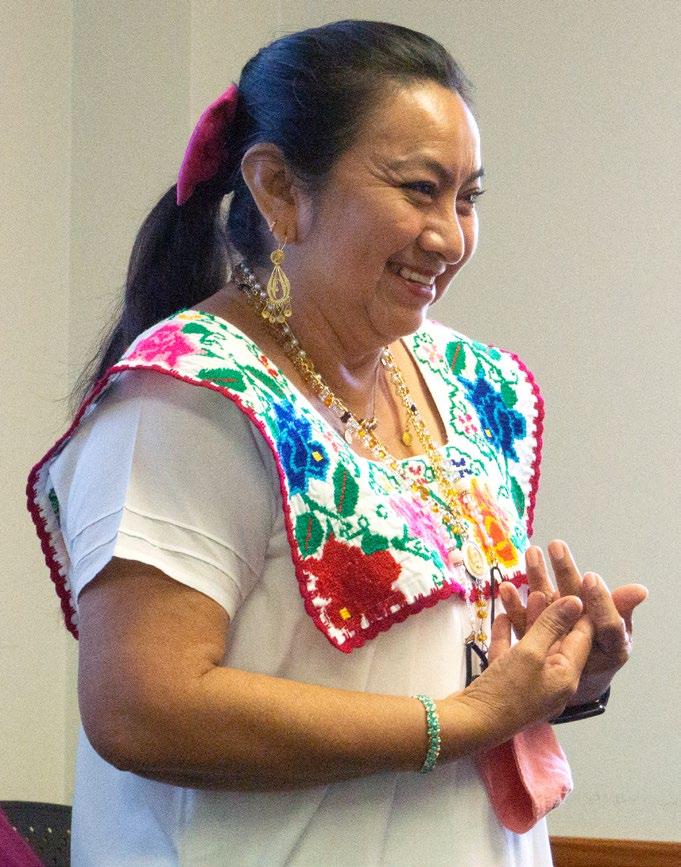
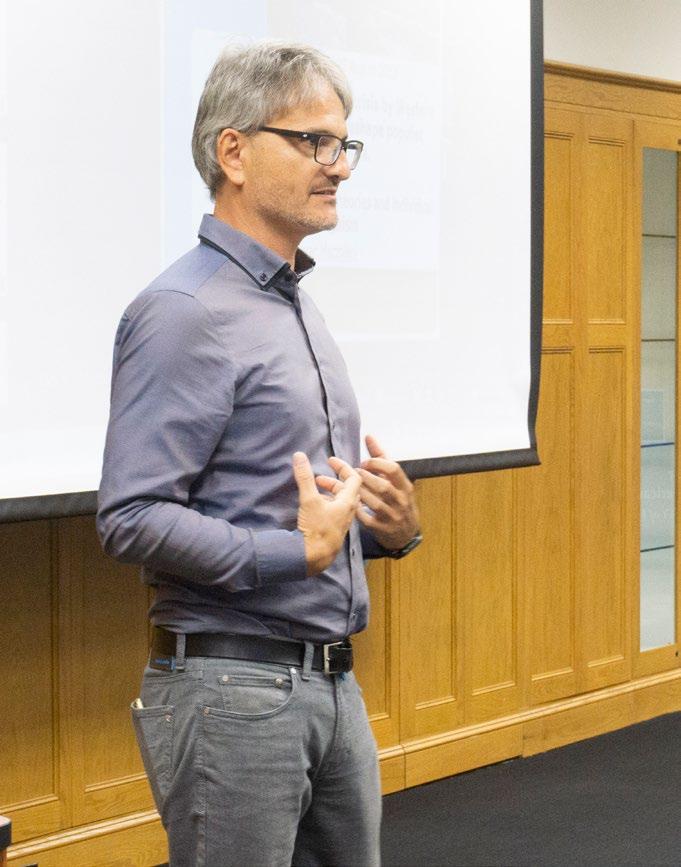
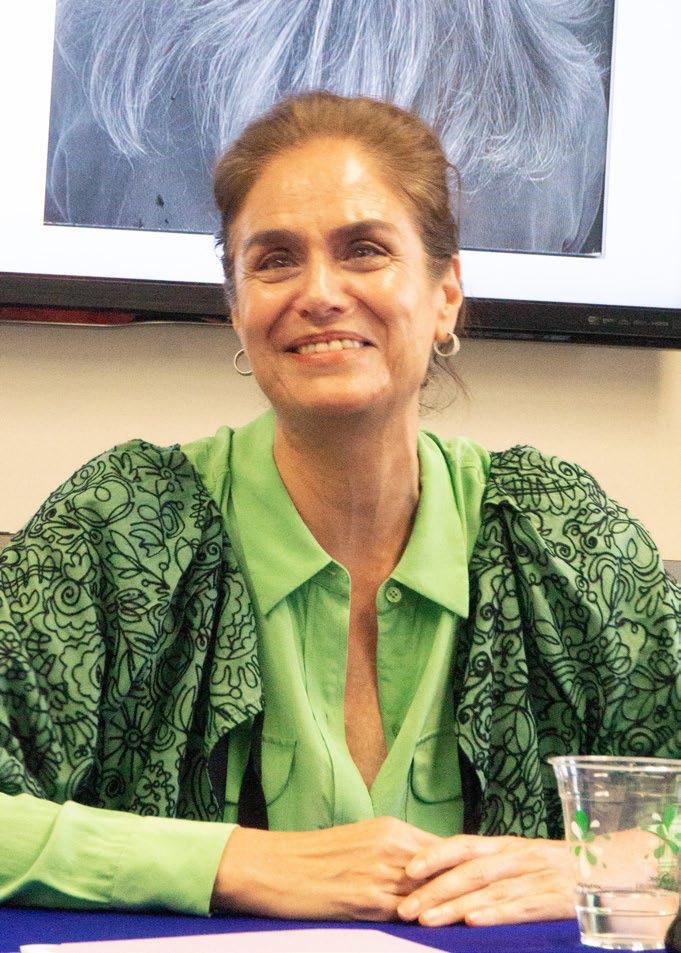
11 5 8 2 7 1 9 10 4 12 EVENTS 3 6
photo by Matt Pendleton
Outreach NEWS & EVENTS
Exchange initiative connects teachers from U.S. and Campeche to support intercultural curriculum design
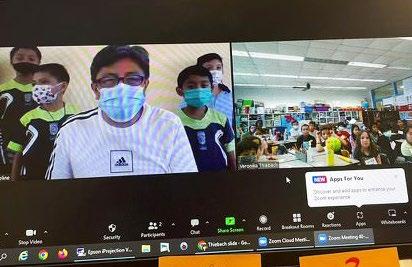
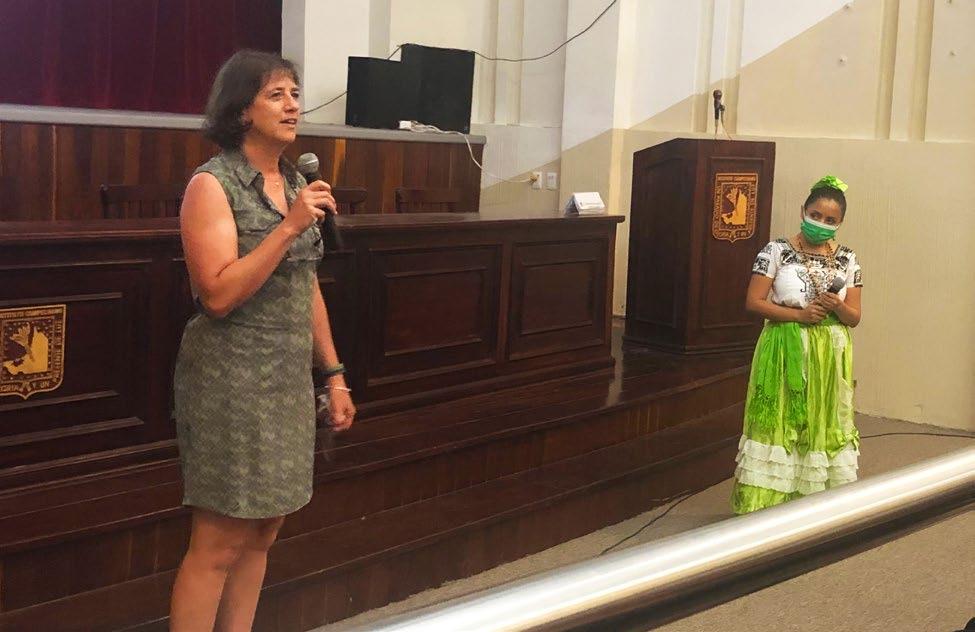 BY VERONIKA THIEBACH
BY VERONIKA THIEBACH
In the last issue of The Latinamericanist, it was announced that in the summer, “eight teachers will be participating in a ten-day program in Campeche to further develop relationships and projects among educators.” I was one of those eight fortunate educators.
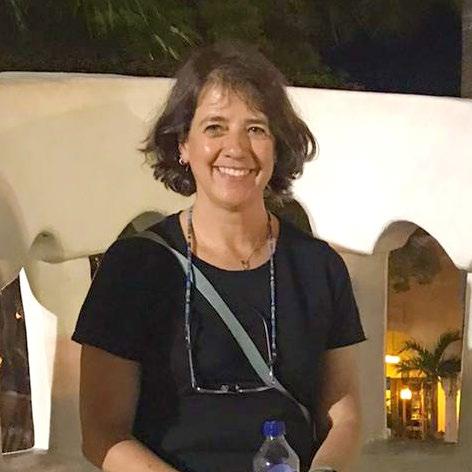
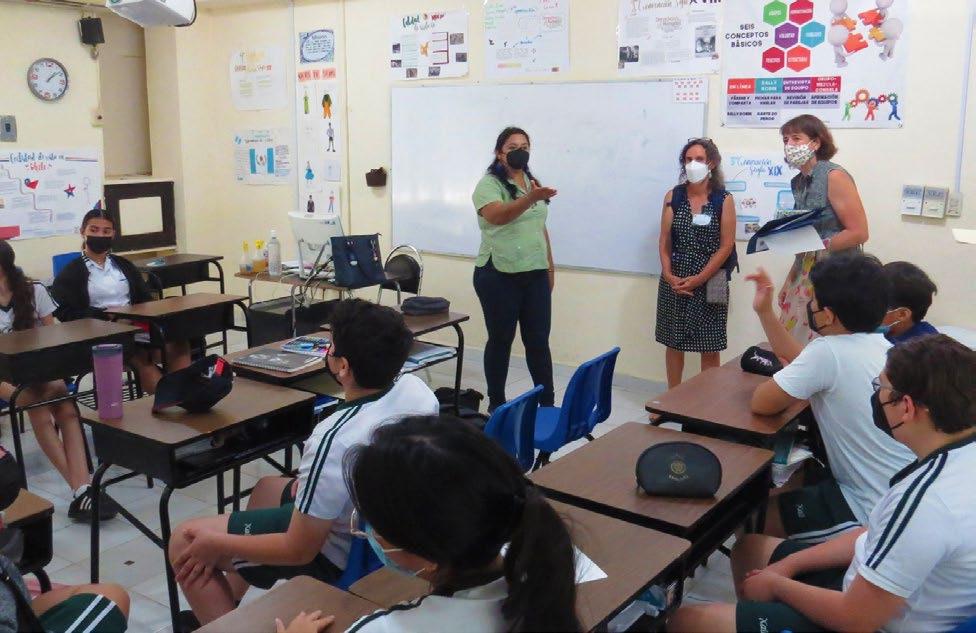
Over ten days in June, we visited significant sites including the graveyard in Pomuch and the Mayan ruins in Xtampak, met hatmakers, Mayan beekeepers, and the mayor of Campeche, and enjoyed authentic western Yucatan cuisine. But more importantly, we met teachers from, and in, federal, state and private schools as well as educators at the Instituto Campechano and the local university to gain a better understanding of what teaching looks and feels like in this part of Mexico. We found our professional experiences had much in common, such as teaching in the face of insufficient funding and grappling with the impacts of COVID-19 on our students’ learning progress. And I made some wonderful new friends, one of whom became my partner for a virtual exchange project this fall. Over the course of five Zoom meetings, Diocelina Aviles’ students at Elementary Public School ‘Joaquin Clausell’ in Campeche and the third grade magnet students at Joseph Williams Elementary School in Gainesville, Florida learned from each other about family and cultural traditions, their respective home cities, and about each other.
What an amazing and authentic way for my students to begin learning about the geography, culture and economy of Mexico – a required social studies topic for third graders in Florida! As for me, I am so much better equipped to teach about Mexico and to infuse the curriculum with global themes, such as the importance and nature of community throughout the world and our responsibilities as global citizens. The Center’s Global Leader Teacher Institute and UF’s Virtual Exchange Training programs have been both personally and professionally transformative for this public elementary school teacher and I thank Dr. Mary Risner and the Center for Latin American Studies, the Longview Foundation, and the Sister Cities of Volusia for making my participation possible. ◆
12
Elementary school educator reflects on impact of professional development travel program for teachers
Top to bottom: Ms. Veronika Thiebach speaking at the Instituto Campechano; Ms. Thiebach visiting a classroom at Colegio Xail; the virtual exchange meeting with Ms. Thiebach’s third grade class and students from Ms. Diocelina Aviles’ class in Campeche
Campeche professor Irene Yolanda Aké Ché shares perspectives on Maya education
Exchange initiative brings Profesora Irene Yolanda Aké Ché from Mexico to Gainesville to connect with students and professors
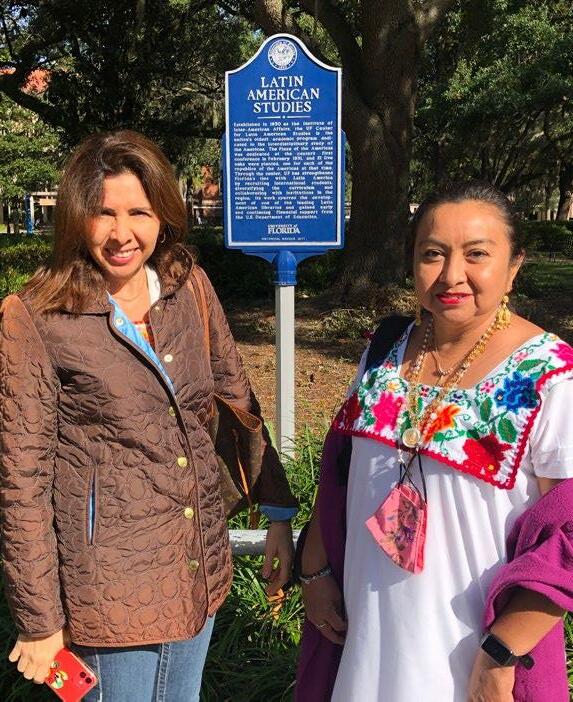
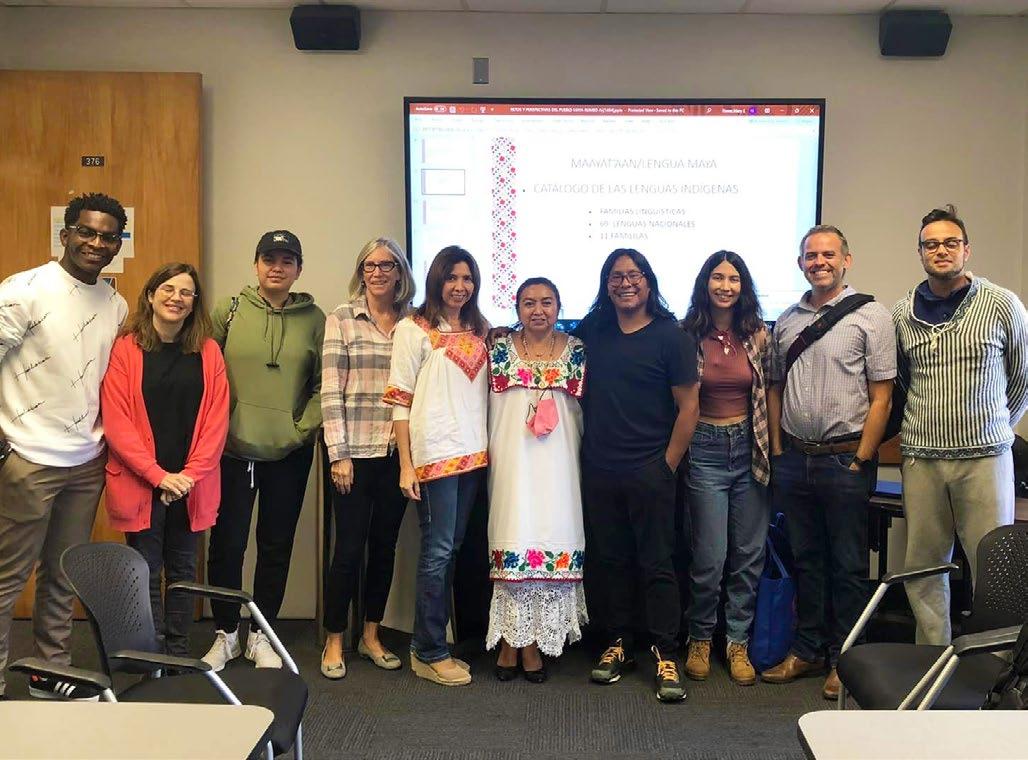
As part of the continuing collaborations between UF LAS and the Universidad Autónoma de Campeche (UAC), the Center was delighted to welcome Irene Yolanda Aké Ché, instructor of Mayan language and culture from the UAC’s Centro Español y Maya (CEM). Monica Guerrero Sasia, CEM director, was also part of the visit. They were here to commemorate the International Decade of Indigenous Languages (IDIL 2022-2032) and discuss future partnerships and possible projects with students and faculty at UF and Santa Fe State College. ◆
State college professor conducts virtual exchange with high schoolers in Monterrey
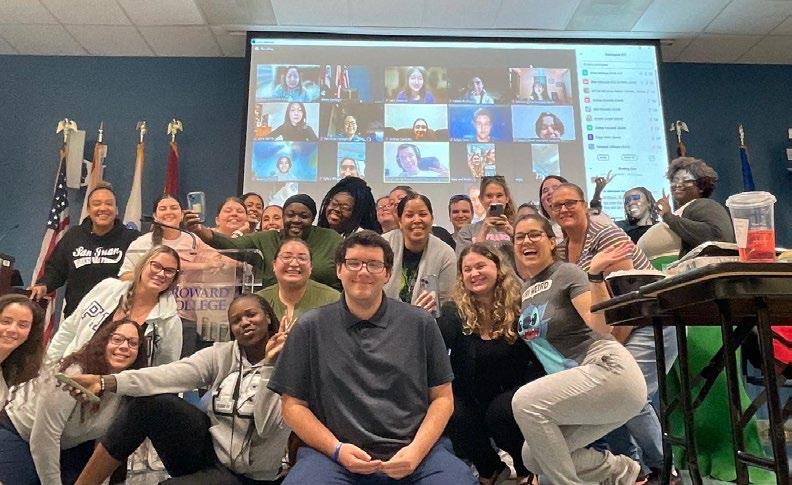
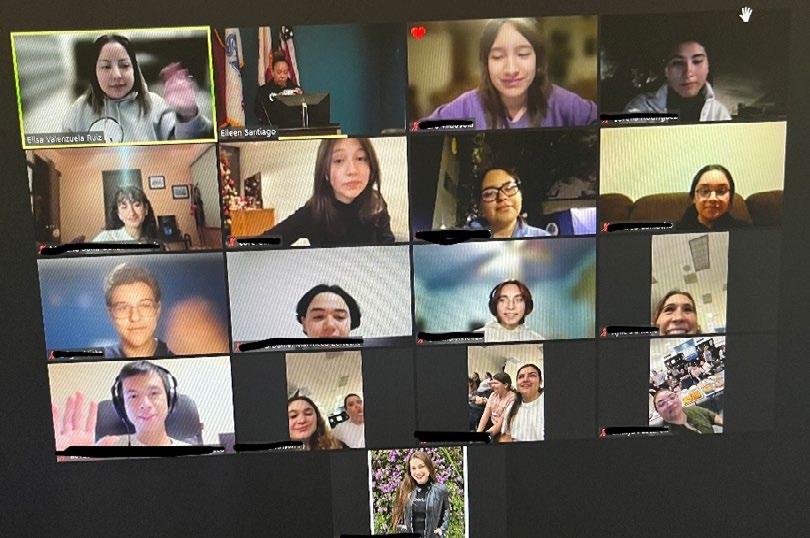
U.S. and Mexican students connect online for intercultural learning, sharing
Pre-service teachers at Broward College were part of their first virtual exchange with high schoolers in Monterrey, Mexico. Ms. Elisa V. Ruiz and Ms. Eileen Santiago collaborated with two cohorts to give the students the opportunity to experience working with students abroad and create an intercultural connection. The groups used Flip.com, a video discussion app, and Padlet, a program where you post text, images, links, documents, videos and voice recordings to communicate in the three-month period of the exchange. Both groups shared introductions, favorite meals and fun places in the community using the apps. A Zoom party was the culminating event with students at Broward College preparing a potluck and sharing the recipes on video. The students in both programs enjoyed meeting live on the platform. This exchange gave both groups the experience to meet other students without paying a trip and leaving the country. It allowed students to increase cultural competence and create a connection between the schools. ◆
13
Ms. Elisa V. Ruiz’s class in Monterrey, Mexico (top) joins the virtual celebration event with Ms. Eileen Santiago’s class at Broward College (bottom) via Zoom, after completing a three month exchange project
Above: Irene Yolanda Aké Ché (center) with Center students and faculty
Below: Irene Yolanda Aké Ché and Monica Guerrero Sasia with the UF Center for Latin American Studies marker
Partnerships & INITIATIVES
Humanities grant supports expanded press acquisitions in Latin American Studies
BY MARICARMEN TORRES MEDINA
My first book collection can be characterized as an act of robbery. I started to seize some books from my parent’s library when I was about eleven years old. Before that, books were handed to me; I had some traditional fables or fairy tales, and a book of Puerto Rican traditional short stories by Puerto Rican writer Isabel Freire de Matos.
However, soon I discovered that on the top shelf of a closet, together with old salsa LPs, family albums, and Christmas ornaments, there were some books that belonged mostly to my father. Because of my parents ‘ life stories, I began paying attention to them—and smuggling them into my room.
My parents met during their university phase and were part of “Fuerza Verde,” the youth group affiliated with the pro-independence party. Their book collection reflected this; reading for me started with stories of events of colonial status that translated into the form of the books that I was finding at home: biographies of Puerto Rican nationalists, histories about Caribbean nations’ struggles for independence.
In the same way we all build our collections— whether music, art, antiquary, or books— publishers and presses build their own. Walter Benjamin declared that every collection sits on the chaos of memories. This means that the power of collecting is not in the object itself, but in the story behind it, the relationship between the collector and the object.
This past summer, I became a member of the acquisitions department at the University Press of Florida (UPF), thanks to a collaboration with the Center of Latin American Studies. My internship was possible because UPF was awarded the Sustaining the Humanities through the American Rescue Plan (SHARP) grant from the National Endowment for the Humanities (NEH) to expand its collection of works from underrepresented communities, Latin American Studies included.
This experience gave me a glimpse into the relationships between collector and objects—in this case, the press team and the acquired works for publishing. During my time at the
press, I broadened my understanding of labor in the production process of a book. One of my first discoveries was that while many of us have an idyllic impression of the finished product, manuscripts are not perfect, and there is a whole nuanced process that brings them to publication.
Editorial team members have a central place in shaping collections. For starters, there are various kinds of editors: acquisition, developmental, and copyediting. Other professionals such as translators work sometimes as double agents. An acquisitions editor does a little bit of everything: some copy editing, developmental tasks, and in some cases, even translation. But mostly their best and most important skill is to serve as companions to scholars and intellectuals during the first half of the life cycle of a book. Acquisition editors serve as liaisons between potential projects and the institutional mission. They are expected to have close links with communities and other institutions. They see—and foster— the potential of established authors and junior scholars, and encourage them to pursue their intellectual efforts. They are the first front of publishing.
Working in an editorial house means that, for the most part, one lives and breathes the press collection. There are only so many books that can be published each year, and as such, the possibilities are always greater than the space and budget available to make it possible. So how are the books chosen?
During my fruitful weekly meetings with Stephanye Hunter, editor-in-chief, I learned about the dynamics of collection building and the place of the acquisition’s editor working in Modernism, Medieval, and Latin American Studies. She would assign me proposals she had received, either through the submission’s inbox or her multiple outreach efforts directly. Editors can seek out authors at conferences, referrals, or pure personal interest. In each case, we would read the proposals, the writing samples—and in some cases, whole manuscripts. Later on, we would meet to discuss them.
The first time we did this exercise, I drew from my previous experience as a translator. I focused on the context, the topic,
14
MALAS student reflects on her internship at the University Press of Florida
In the same way we all build our collections— whether music, art, antiquary, or books—publishers and presses build their own.
“
“
and the region, and I also sought to analyze the general structure of the project and the correspondence between the main argument with the proposed chapters. I also tried to get to know the author’s background and previous scholarly work. Trying to understand the mind frame of the author and their position towards a certain topic, I would immerse myself in the subject, proving later that as the working volume grew, my current strategy took more time than expected. It is impossible to read all manuscripts at once! Lastly, I discovered that my likings and preferences in relationship with topics and mode of intellectual query also swayed me sometimes towards some projects over others.
One of the first things Stephanye shared with me is to think about how the new addition could work within our current collections. It is a book that would stand alone? Do we have any other book that works with the same topic? What does this manuscript provide to the intellectual discussion of the subject? Who is the ideal reader of this book? What are the strengths and the weakness of the arguments and organization of the project? What can this book do in terms of providing a new way to approach Latin American Studies?
These questions gave me an important framework for evaluating and selecting acquisitions. During the course of my time at the press, I came away with some other key points:
Collections come from all places
Collections are built from the conglomerate of stories and histories, schools of thought, trends, biases, institution missions, and political, scholarly, and community relationships.
A book needs an audience
To think about books is to also think about commodities. Marketing is a department that enters the process very early on in the publishing process and stays until the very end. The strategies pave the path for the circulation task and center on the projection of the book’s life. After all, what is a book if it cannot find its readers when published? The weight or lack of revenue is a good way to distinguish what type of cultural institution we are talking about. University presses for the most part are mission-driven and non-profit.
Manuscripts are a process
Manuscripts are not an act of revelation but the product of constant intellectual effort and collaboration. In order to build better foundations, knowledge has to be approached dialectically. It must be put to the test, allowing people to agree, and disagree. Diversity should not reside solely in aspects of identity or theoretical trends solely, but in the strength of the critical approach and kindness that arises through collaboration. Cross-disciplinary approaches are essential to this task.
Different styles are welcome
More and more presses are questioning how scholarship can acquire another mode of expression, seeking texts that are able to speak to different styles—without compromising
erudition—in order to reach out to broader audiences and to make the content available to the communities with which we work.
Books are found in translation
When thinking about broadening the access and representation of Latin American and Caribbean countries in the editorial world, translation plays an important role in making the connections possible. In the case of Florida, those stakes are higher, as the peninsula serves as a middle ground between the rest of Las Americas and the continental U.S. Latin America
and the Caribbean contain multitudes
Within Latin American and Caribbean studies, the Press challenges our notions and understanding of how we define Latin America. In my time as a student at the Center, I have seen that most Spanish-speaking countries have acquired a special predominance within Latin American studies. It is true that when we utter the word “Latin,” there is a direct correlation to those cultures and languages that center on the evolution of the Latin tradition. However, I have also seen that the Hispanic origin countries tend to monopolize their presence in Latin American settings. However, we should not forget the strong presence of Brazil and Portuguese and the place of French Guyana in South America. Furthermore, when discussing the Caribbean, we tend to forget that beyond Cuba, the Dominican Republic, and Puerto Rico, there is the French Caribbean, the Dutch Caribbean, and the Anglophone Caribbean as well.
Collaboration requires constituency
In order to achieve maximum experience, institutions must work together, regardless of the discipline, especially when thinking about underrepresented communities. I would like to think that if we aspire to foster scholarship, projects, and community inclusion, long-term collaborations should be sought. There is a great opportunity to enrich learning experiences when we start looking at the different fronts where Latin American, Caribbean, and any other area studies are present. I have seen coming together the UPF, the Center for Latin American Studies, the Harn Museum, and the Latin American and Caribbean Collection of Smathers Libraries. But to foster this relationship is not to expect the sole effort of institutions. We too, as students, scholars, and faculty, have a place in holding institutions accountable, not as a way of a mere discursive retaliation, but through action, engagement, interest, and continuous dissensus. Scholarship can be practiced from different fronts. The area studies have shown us that work must not be limited to the classroom. In this sense, the UPF is an engaged institution with a great group of people that regardless of some of the social and political challenges, including economic constrictions, make the most out of it, and bring disciplines together. ◆
UPF’s Latin American Studies collection: bit.ly/3I6Bz0r
Partnerships & INITIATIVES
Collaboration between libraries and farmworkers grows historical archives and community bonds through storytelling
BY DANIEL FERN Á NDEZ-GUEVARA
On December 18, a group of staff and collaborators from the Latin American & Caribbean Collection (LACC) at UF’s Smathers Library handed out pink bookmarks to attendees for this year’s posada celebrations at the Farmworkers’ Association of Florida (FWAF) Apopka office.1 The bookmark offered a QR code to connect attendees to a video produced by UF librarians, historians, and activists, compelling viewers to “Tell us your story.”2 The pilot video for the campaign depicts the family story of LACC librarian Margarita Vargas-Betancourt. In a heartwarming scene with her son Roberto, Margarita insists on sharing her family’s past because “to know who you are and where you are going, it’s important to know where you came from, and we come from Mexico.” The promoters of this project hope to inspire farmworker communities to broaden their collaboration with the libraries, and share their own stories in oral history interviews.
In August 2022, the FWAF, the Rural Women’s Health Project (RWHP), UF George A. Smathers Libraries, and the University of Miami (UM) Libraries obtained a planning grant to investigate best practices to record the stories of Florida farmworkers for historical archives. The “Archiving Farmworkers’ Histories” project, made possible through an Institute of Museum and Library Services (IMLS) National Leadership Grant, aims to create safe, cooperative spaces to archive and access oral histories, bringing together partners from community-based organizations, library specialists, graduate students, farmworkers, extension officers, and others to make archival practices more equitable.
The project team consists of UF and UM library specialists, a historian, one extension officer, and a PhD student in agricultural education. In addition to their community partners, the Farmworkers Project has five consultant experts: three in community-driven archiving, and two from other communitybased organizations that work with migrants. The project aims not only to bolster the trust between the libraries and the communities they serve, but also to survey their archival needs and to design archival and access strategies to ensure the safety of these communities. Among the methodologies employed, the Farmworkers Project sponsors and participates in FWAF and RWHP community events alongside their leaders, conducting and sharing oral histories at community events and through keepsakes.
A small portion of the IMLS funds helped FWAF provide food for their posada event. Posada attendees included FWAF members and their families as well as several members of the UF team, including Dr. Vargas-Betancourt, Associate University Librarian of Agricultural Sciences & Digital Scholarship Susan Stapleton,
Left to right: Nezahualcoyotl Xiuhtecutli (FWAF General Coordinator), Daniel Fernández-Guevara, Claudia Díaz Carrasco, Margarita Vargas-Betancourt, Susan Stapleton
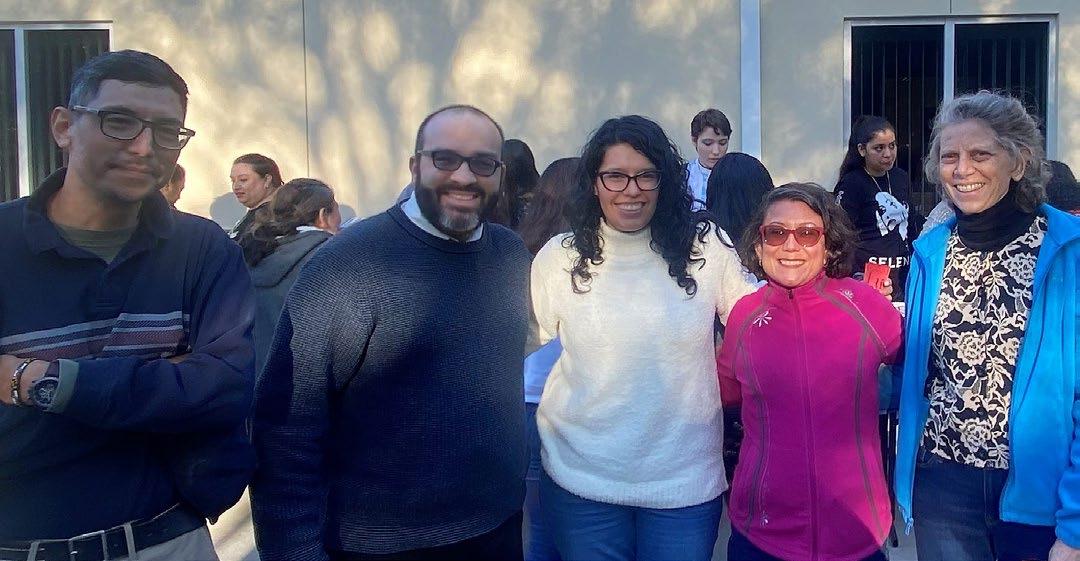
PhD student and Extension Fellow Claudia Diaz Carrasco, and Project Coordinator and recent-UF PhD history graduate Daniel Fernández-Guevara. Members of the UF team have also volunteered at a vaccination drive held in Ocala organized by the RWHP. The goals of these collaborations are to build trust between minoritized communities and the libraries and to make the constituencies of these underserved groups visible in library collections and in online media.
The project is part of the Latin American and Caribbean Diaspora Initiative, which seeks to document the histories of migrants to Florida from Latin America and the Caribbean at UF’s LACC. The initiative includes two online exhibits: The Cuban American Dream and The Haitian American Dream. Both discuss universal aspects of immigration while highlighting the specificity of Cuban and Haitian stories. In 2020, the initiative continued with an effort to document the impact of COVID-19 on Florida farmworkers. The LACC collected 32.1 gigabytes of digital content and now looks to do the same with the IMLS grant.
For the UF team, the success of the Farmworkers’ project is measured in reciprocity; it’s as much about learning from the communities as it is about helping FWAF and RWHP archive and preserve their documents. During a visit to RWHP headquarters, Dr. Fernández-Guevara and Dr. Vargas-Betancourt met with its director, Robin Lewy, who donated a sample of the fotonovelas the organization used for community education. In Latin America, fotonovelas are a traditional print medium similar in format to comic books or graphic novels, but that illustrate a story. Fotonovelas educate effectively because they originate from the traditional way the people of Latin America and the Caribbean transmit knowledge through storytelling. The Farmworkers’ Project hopes to inspire other large institutions to augment their efforts to connect to the communities they serve. ◆
1 A posada is a traditional Christmas celebration in Mexico.
2 You can see the video at: youtu.be/0878LDMwyfk
16
Welcoming Clate Korsant to the Center
New Assistant Director of Academic Affairs brings expertise in teaching and social anthropology, plus enthusiasm for student mentorship and intellectual process
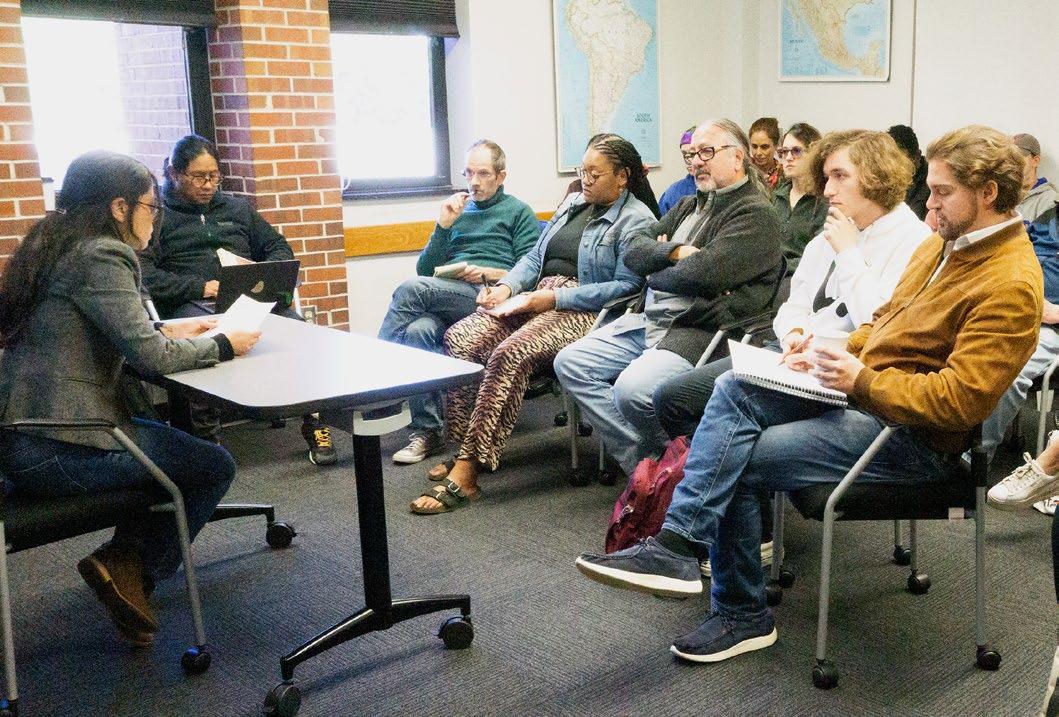
This semester, the Center welcomed a new member to our academic leadership team: Dr. Clate Korsant in the role of Assistant Director of Academic Affairs! Dr. Korsant’s responsibilities include overseeing the Center’s academic programs and advising MALAS students, as well as teaching one course per semester.
The opportunity to work with and mentor graduate students was the spark that ignited Dr. Korsant’s initial interest in the position. “I keep thinking back to what I wish I had known when I was a graduate student,” he says. “I hope I’m able to help them get the most out of grad school, and prepare them on what to expect next, whether it’s a PhD program or a profession.”
Dr. Korsant’s enthusiasm for mentorship stems from his background in teaching, the topic of his first master’s degree and his first jobs out of college. His teaching philosophy is similarly student-centered, with a classroom format that encourages discussion and engagement. “I always want to give students a platform to discuss amongst themselves,” he says. “My job as a teacher is to help students dig deeper into everyday worlds and giving them tools to reach their own conclusions. They’re on an intellectual journey and their learning is never really completed. Teaching is like being a guide on that journey.”
Dr. Korsant’s own intellectual journey was impacted by experiences in a classroom—teaching in a bilingual school in Puerto Rico, where the immersive experience sparked an enthusiasm and inquisitiveness about being around different people. This motivated Dr. Korsant to earn a master’s degree in Cultural Anthropology and a doctorate in Social Anthropology. His dissertation examined socioenvironmental conflict and justice in Costa Rica’s biodiversity-rich Osa Peninsula, where the entanglements between conservation laws, scientists, activists, tourists, and local citizens illuminate the complexities of environmentalism. After completing the dissertation, Dr. Korsant produced and wrote the ethnographic documentary film “Lifting the Green Screen” based on his research.
The project cemented his love for the ethnographic process: following people’s actions at a ground level and bringing in ideas from a range of disciplines to analyze the different dimensions of real-world behaviors and interactions. “I really love what ethnography offers in terms of storytelling,
and its intellectual process, and how open it is to bringing in new ideas,” he says. “The science of the human is so broad. You can really look at any problem in a number of ways, but you’re always situated in the question of what people are doing.” He points out that ethnography is particularly suited to Latin American Studies, because it lends itself well to interdisciplinary thinking.
Here at the Center, Dr. Korsant taught “Intro to Latin American Studies” in the fall, and will be translating his research passions into teaching the new course “Ethnographic Storytelling, Subjectivity, and the Visual in Latin America” in the spring. His “Intro” course took a different approach with the discipline: from the perspective of the arts and literature, illuminating Latin America not just as a region, but a network of themes. Undergraduate students got a primer on Latin America through real-world topics at the intersection of culture, history, economy, and infrastructure.
As his first semester comes to a close, Dr. Korsant says that his time at the Center has already proven both rewarding and promising. “My first semester has been a lesson in interdisciplinary education, with explorations in crosscutting interests from social science to ecology to the humanities,” Dr. Korsant reflects. “The dynamic student body is in many ways the soul of the Center and I’m happy to play a role in their journeys. I also continue to be impressed with the college-town community where you’re never far from a gator... both types!” ◆
17 Faculty SPOTLIGHT
STORIES FROM THE CENTER
Dr. Korsant (far right) attends MALAS student coloquio
Student SPOTLIGHT
MALAS students organize coloquio on photography
Kleber Naula, Francisco Sánchez, and Maricarmen Torres Medina (MALAS 2023 ) present their observations
After watching their professors present research at the Center’s faculty coloquios, MALAS students Kleber Naula, Francisco Sánchez, and Maricarmen Torres Medina had the idea to organize a student coloquio of their own. The trio sought to develop their skills in research communications and gain practice in public speaking. Taking iniative on the project, they coordinated the event with Center staff and invited their peers and professors to attend.
“Putting photography on the spot: MALAS students’ insights and experiences from the photographic field” centered on the power of image in their research, a thread connecting all three of their projects, albeit through different lenses. Maricarmen’s presentation offered a theoretical analysis, challenging the audience to “see the unseen” in art images. Kleber’s presentation delved into his quest to uncover family photos taken by U.S. Peace Corps volunteers, illuminating the ethical issues of tourist photography and the images of Indigenous communities that they render. Francisco’s presentation examined the ways that photo-ethnography, a powerful tool, can easily lead to misrepresentations if a researcher isn’t taking care with their imagemaking. Center affiliate Richard Kernaghan (Anthropology) followed up with commentary for the students. Attendance for the event spilled into the hallway, with students, professors, and staff all gathering to support the student-led coloquio and learn about the intellectual work they’re undertaking. The Center plans to continue hosting student coloquios in the future, thanks to Kleber, Francisco, and Maricarmen’s initiative. ◆
A farewell Q&A WITH JOEL CORREIA
In December, the Center says goodbye to Professor Joel Correia, who is departing for Colorado State University. Before his last day at UF, he shared about his Fulbright Scholar Flex award project, his new book, and his time at the Center.
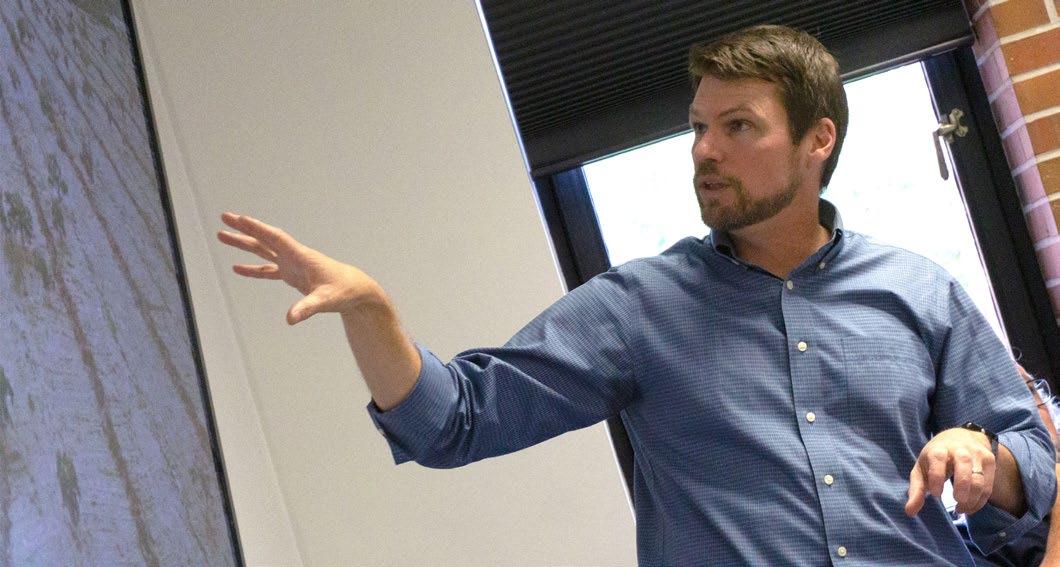
Q: Dr. Correia, tell us about your Fulbright project.
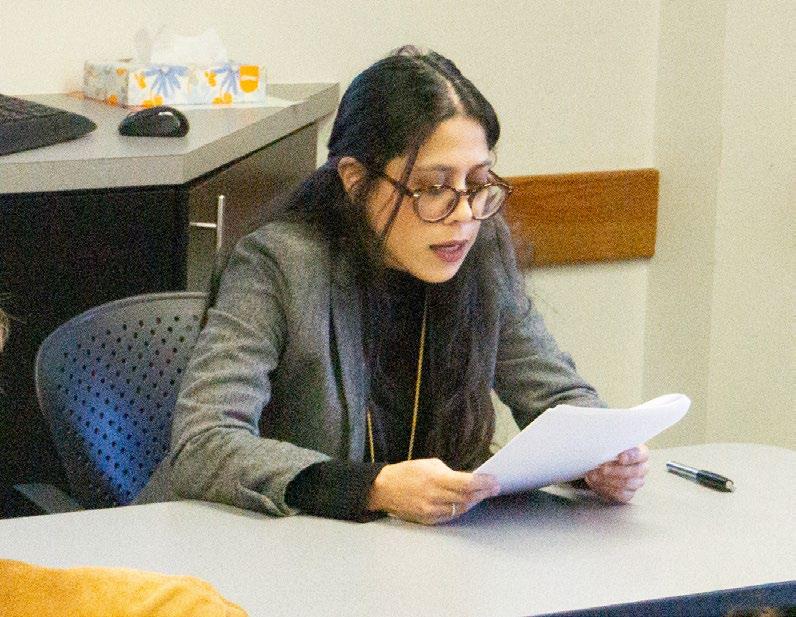
A: I am conducting research on the construction of megainfrastructure projects in Paraguay’s Chaco, principally the new bioceanic highway. This part of Paraguay is rapidly changing as cattle ranching, land speculation, and soybean production expand. One goal of this research is to document the effects of these changes on different sectors of society while emphasizing the impacts on Indigenous and criollo wellbeing. I will continue this work in the second phase of the award in mid-2023.
Q: You also have a book project coming out soon, yes?
A: You are right! Disrupting the Patrón: Indigenous Land Rights and the Fight for Environmental Justice in Paraguay’s Chaco with be published open access by University of California Press in April 2023. Based on long-term collaborative research, the book follows three Enxet and Sanapaná Indigenous communities’ struggles for land rights and makes an intervention into debates about the dynamics of environmental justice, neoliberal multiculturalism, and Indigenous resurgence in Latin America’s forest frontiers.
Q: We’re sad to see you leave the Center. What’s next for you?
A: After four and a half wonderful years as a faculty member here, I will begin a new position as Assistant Professor in Human Dimensions of Natural Resources at CSU. I am deeply grateful for my time at the Center and have been honored to work with our students, collaborate with faculty peers, and be a member of the TCD and MDP programs. At CSU, my research program will remain the same, and I will maintain projects in the Gran Chaco and Ecuadorian Amazon. I look forward to finding new ways to collaborate with the Center into the future and extend my thanks for the support over the years! Hasta el próximo! Abrazo fuerte!
18
◆
on the impact of photography in their research
STORIES FROM THE CENTER
MALAS students present research, insight on Colombia elections
Alongside faculty and a guest scholar, Donovan Carter and Juan Carlos Moreno Perea (MALAS 2023 ) gave presentations on racialized Colombia and historic election
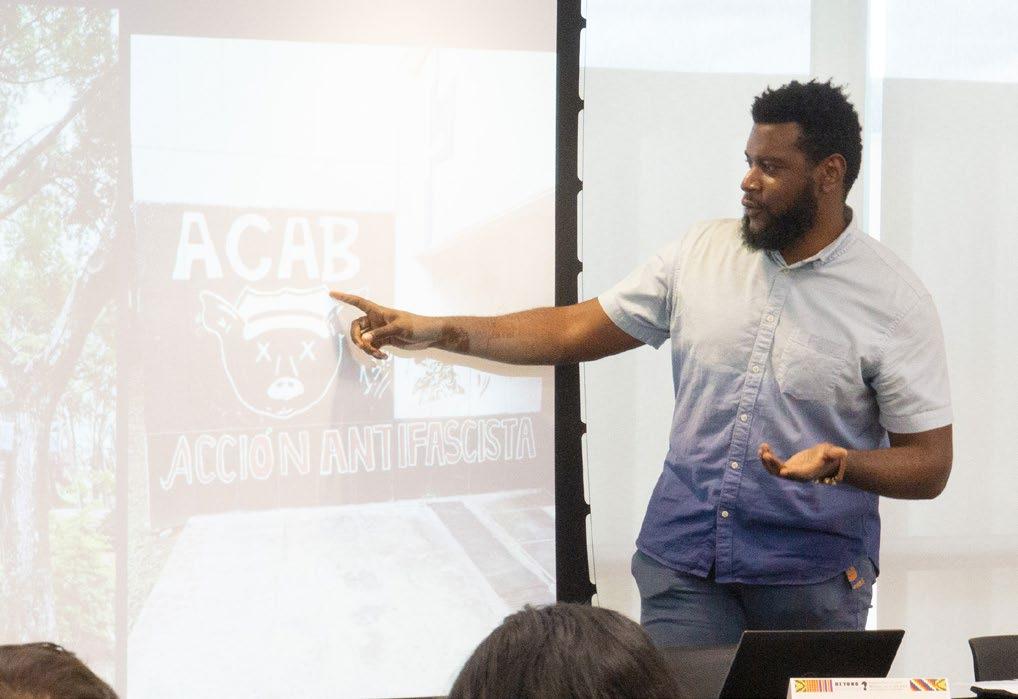
With the victory of Gustavo Petro in a run-off this May, Colombia elected a leftwing president for the first time in its history. The election signifies the prospect of a progressive future for Colombia, fueled by the tide of marginalized voters, particularly Afro-Colombian and Indigenous, that showed up in droves for Petro – and Francia Márquez, the Afro-Colombian grassroots activist who is now vice president of the country.
Such a landmark sociopolitical event offered robust discussion for the Center’s fall symposium, “Beyond Symbolic? Gustavo Petro, Francia Márquez, and the New Policy of Inclusion in Colombia.” As the title suggests, the symposium sought to discuss questions of what might come next for Colombia, and if a leftwing government would lead to actual social or material change for underrepresented Colombians. Led by Wayuu scholar and anthropologist Weildler Guerra Curvelo as the keynote speaker, the event also featured an interdisciplinary panel of Colombian professors affiliated with the Center: Paola Uparela (Spanish, Gender Studies), Juliana Restrepo Sanín (Political Science), and Augusto Oyuela-Caycedo (Anthropology).
Importantly, two additional voices rounded out the schedule of speakers: those of MALAS students Donovan Carter (right) and Juan Carlos Moreno Perea (featured on the cover of this issue). Donovan presented his research on Cali, Colombia during the 2021 national strike that was a crucible for progressive sentiment in the country, a result of police violence and government crackdowns on protests. “I went to Cali a year after the paro nacional [national strike], in the heat of election season,” Donovan shares. “The whole city was talking about Petro, and I could still see effects of the strike in anti-police street art everywhere in the city.”
Images of graffiti took center stage in Donovan’s presentation, illuminating the inextricable connections between race, protest, and politics in Cali. “Graffiti is such a unique medium,” he says. “It’s so grassroots, with connections to anti-establishment counterculture, that it’s very revealing. It spoke for itself better than I could explain it.” For Donovan, a Black man from the United States, seeing anti-police language from the U.S. scrawled on walls in Colombia was particularly affecting: “I was able to see the breadth and scope of the African diaspora in a new light that was really exciting to me.”
Although Donovan and Juan Carlos are both young Black scholars studying racialized Colombia, they are pursuing different research, and of course, come from different backgrounds and perspectives. Where Donovan is from the
southern U.S., Juan Carlos is from the Quibdó-Chocó region of Colombia. A teacher himself, he aims to increase visibility of Black scholars in his country, and his research centers representation in and access to education for Afro-Colombians, which is drastically limited due to racist social convention. “Colombia actually has a really beautiful constitution,” Juan Carlos shares. “But its laws are not being implemented. I’m interested in understanding that implementation gap so that it can be closed one day.”
For the purposes of the symposium, Juan Carlos did additional research to present electoral statistics and cultural context on the election of Petro and Márquez. When asked if their election portends real or symbolic change, Juan Carlos replies: “This is the first time in history that Black people have been able to elect someone who represents us in the national agenda. We actually had five Black candidates for vice president, but Francia Márquez is the one who has been fighting for human rights of Black people since she was young. We know she’s not going to solve all of our problems, but she’s paying attention. She’s shown that she’s trying to do something about it. This is a very good beginning.”
While the symposium’s attendees gained insights from Donovan’s and Juan Carlos’s research, the two young scholars benefited from the opportunity to simply present a topic to peers and professors alike. “Presenting really helped me start conceptualizing and articulating how I want to write my thesis,” Donovan says. For Juan Carlos, it was a return to his element: in a classroom, teaching, and embodying the visibility for Black Colombian scholars that he strives to magnify. ◆
19 Student SPOTLIGHT
STORIES FROM THE CENTER
Donovan Carter shares images of anti-police graffiti taken during his summer field research in Cali, Colombia
Thacher Loutin gains internship experience at UF’s
Career Connections
Center
Role as Career Engagement Intern offered chance to connect in professional growth
Located in the Reitz Union, the Career Connections Center (C3) at UF is a trove of resources and services for students to discover. For Thacher Loutin (MALAS 2023), the C3 offered career development in the form of an internship. From June until August of 2022, Thacher served as a Career Engagement Intern for the C3, which gave her the opportunity to work directly with students in multiple capacities, from large and small groups to one-on-one coaching. “I couldn’t have asked for a better internship,” Thacher reflects. “Nothing gets me more excited than imparting knowledge and making a meaningful impact.”
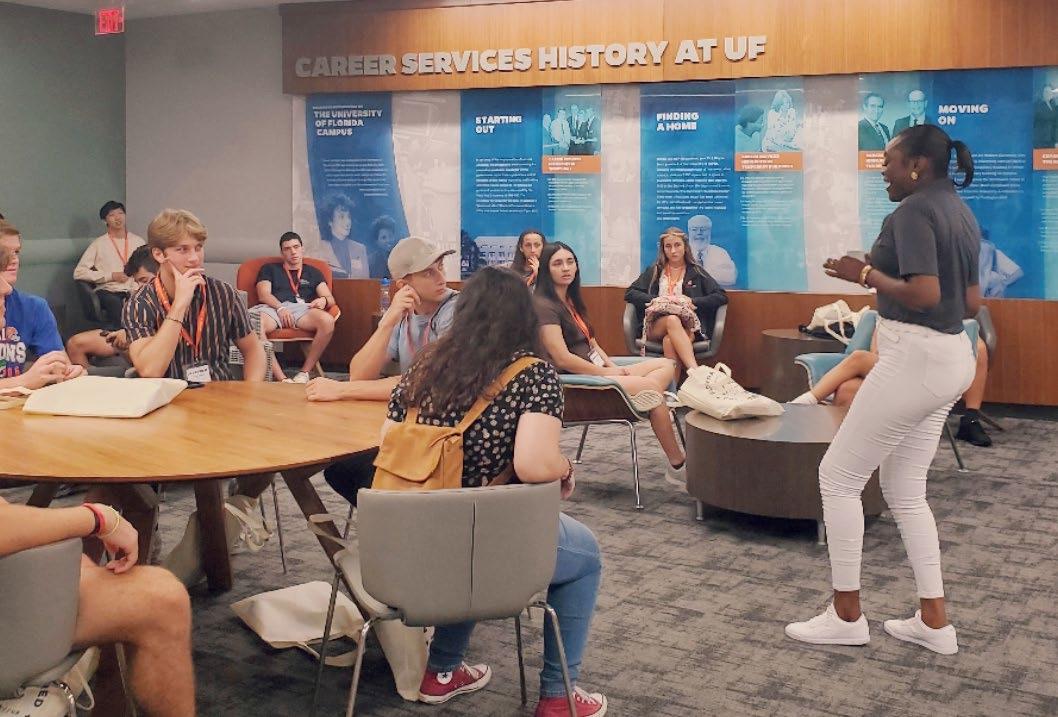
Much like the C3’s offerings, Thacher’s internship tasks were numerous and varied. She met with students to coach them on their application materials and career planning. She gave tours and talks on C3, served as a panelist at the Career Engagement Summit, and presented to over 17,000 incoming students at UF’s preview sessions. She also taught a cohort of First Year Florida (FYF) students. FYF classes are designed to connect new students to the support systems in place at UF, both academic and interpersonal.
Thacher also represented the Center at the C3’s Major and Minor Fair in October, where she chatted with prospective students about Latin American Studies and the opportunities available for undergraduates to get involved. “Thacher has a special ability to connect with students,” says her internship supervisor Alison Noonan. “We were so grateful for her hard work and ability to jump in and help on a moment’s notice.”
Students seeking career guidance and support can visit the C3 website alone and access a wealth of resources, ranging from CV and cover letter samples to professional communications guides and career planning self-assessments. However, the C3’s full spectrum of support comes alive in personal engagement across multiple outlets including career fairs, customized workshops, conferences, and one-on-one coaching. Interns like Thacher are among the personnel who animate the C3’s vision to support, connect, and equip young professionals with the tools they need in the early stages of a successful career path. ◆
Learn more about the C3: career.ufl.edu
Francisco Sánchez awarded 2nd prize in visual sociology
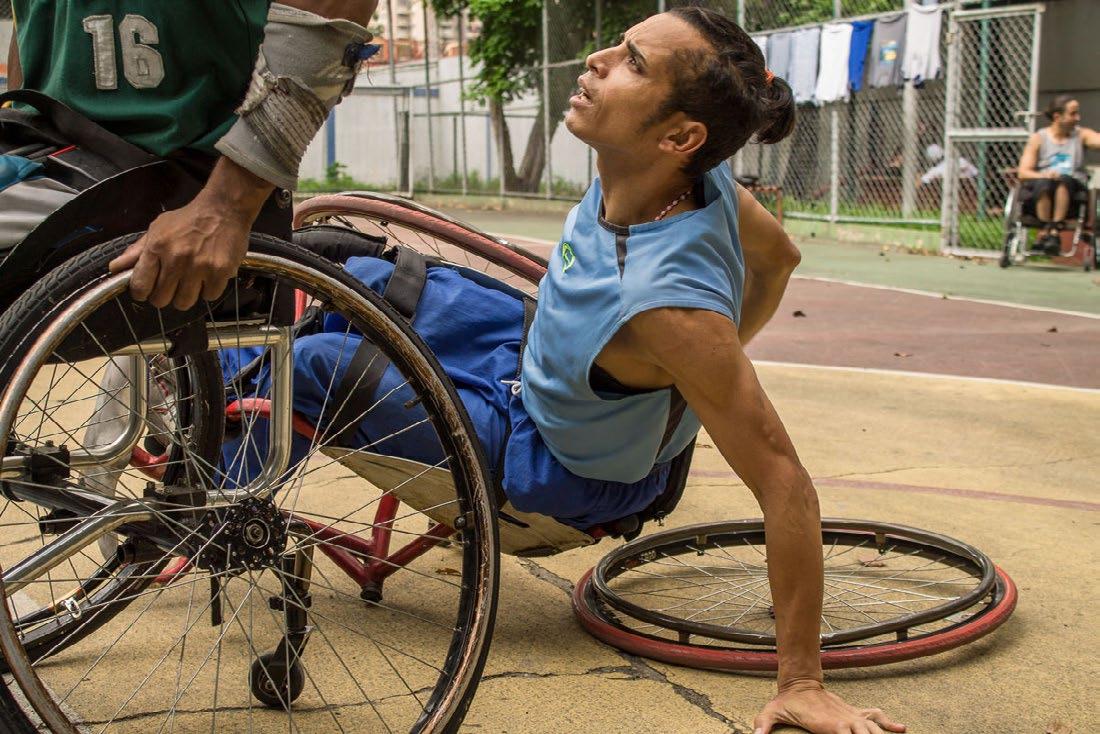
“Get up and go on!” by Francisco Sánchez (MALAS 2023) was awarded 2nd place in The Rachel Tanur Memorial Prize for Visual Sociology by the Social Science Research Council. Francisco’s photograph was selected in conjunction with his written commentary of the photo, which taken during his previous fieldwork in Venezuela. Congratulations, Francisco!
Read the full story “Get up and go on!” bit.ly/3TcWtxz
20 Student SPOTLIGHT
Thacher Loutin giving a tour in Career Connections Center
STORIES FROM THE CENTER
Sofi-Nicole Barreiro explores identity formation among UF students with Miami-Dade, Latinx background
Interviews with Latinx students from Miami-Dade County illuminate nuance and commonalities — but no singular ‘Latino experience’
In the fall of 2017, 3,3621 undergraduate students from MiamiDade County started the semester at the University of Florida. Sofi-Nicole Barreiro, a freshman pursuing political science and Latin American Studies, was one of them. By the time she graduated in 2020, UF’s undergraduate student population identifying as Hispanic or Latino/a had grown 13%.1
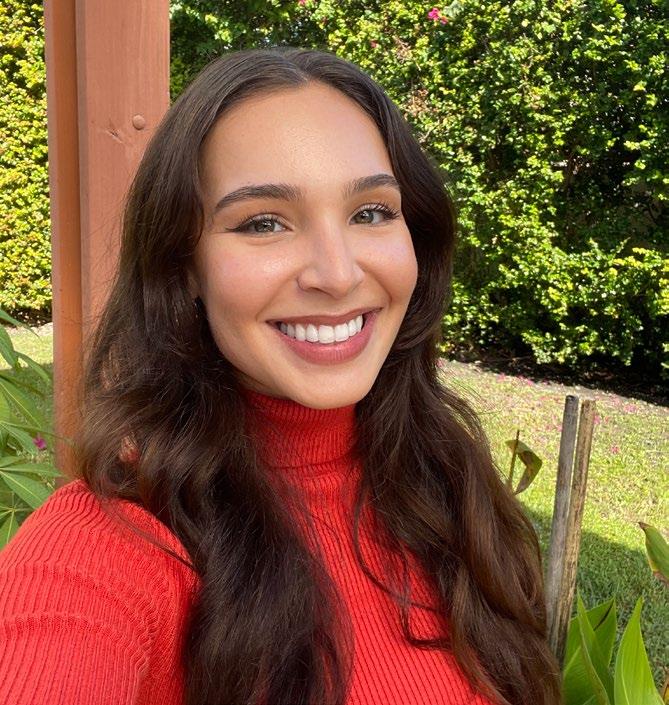
But Sofi-Nicole isn’t as interested in the stories these numbers might tell as much as the stories that these individuals might tell about themselves. How might Latinx students raised in Miami-Dade County navigate a shift in self-perception moving from a predominantly Latino context to a town with cultural characteristics of the rural south? What experiences do they have negotiating their detectable “otherness,” when it comes to language, customs, accent, skin color? How do they see themselves when they return home to Miami-Dade?
Answers to these questions, as one might imagine, are nuanced, individual, and complex.
Embracing the challenge, Sofi-Nicole tailored her graduate school experience around exploring these concepts. For her thesis, she chose to conduct semi-structured interviews with 10 Latinx UF students from Miami-Dade county, ages 21 to 25, and let their stories guide her findings, however complicated. “I can’t generalize my study at all, because there’s no homogeneous Latino experience,” Sofi-Nicole says. “So it’s been a challenge to make sense of all this qualitative data. Even in the span of one interview, there are some contradictions with how someone defines or talks about certain things, like race, for example.”
With nearly two hours of conversation for every participant in the study, Sofi-Nicole found herself combing through lengthy transcripts and flagging hundreds of themes that pointed to identity formation. To support her knowledge development, she sought out courses that would enrich her understanding on ethno-racial Latinidad. “Classes like ‘Race and Latinxs’ with Dr. [Nicholas] Vargas have really helped me with my research, and even my own internal deliberations,” she affirms. “And taking classes with Dr. [Christopher] Busey helped me approach the questions with a critical race theory lens.”
1 Office of Institutional Planning and Research, University of Florida. https://ir.aa.ufl.edu/facts/
Sofi-Nicole’s research was funded in part through the Carol French Doughty Memorial fund, which supports student field research in Latin American/Latinx Studies. Ms. Doughty was a Spanish teacher who grew up in Gainesville and made a career of her passion for Latin America, bilingual education, and civics. If you’d like to honor the legacy of Ms. Doughty in support of students like Sofi-Nicole, you can make a donation to the fund here: go.ufl.edu/las-cfdfund
In part, Sofi-Nicole’s background as a political science major drives her motivation to make sense of such a complicated topic. “Florida is a great place to talk about identity, politics, and racialization,” she says. “We’re a swing state, and there is a lot of political power in Florida that looks very different than what gets conceptualized as a so-called ‘Latino Vote.’”
But this kind of study maps onto a national level, too, Sofi-Nicole points out, as the United States undergoes significant demographic changes, increasingly polarized partisanship, and questions of representative democracy. “Research like this matters a lot in the larger context, because Latinx representation matters,” she urges. “Political representation is so important, now more than ever. We can’t have a real democracy unless the people governing are a reflection of what this country looks like.”
As with any discussions on identity, there’s also meaning on a personal level. Throughout the research, Sofi-Nicole was hearing from her participants that they had experienced a sense of cultural disconnection when they moved from Miami to Gainesville, just as she had. “One of the unexpected parts of this project has been the sense of community I’ve felt,” she shares. “Not just with the support from my professors and peers, but in the process itself – hearing people’s experiences, and being able to say, ‘I feel you, I know what that’s like.’ I’m so honored that people felt comfortable sharing their stories with me, and that I could help amplify their voices.”
In the future, Sofi-Nicole plans to continue this work and bring it to a wider audience, with the hope that it could serve others, too. “Learning about Latino Studies has deeply changed how I view myself and how I understand the world, and I want to share that.” This desire is tugging her in a direction she hadn’t considered taking after graduation: back home to Miami. “I feel like I’ve found a renewed sense that there’s work to be done at home. I want to bring this back to my community.” ◆
21 Student SPOTLIGHT
STORIES FROM THE CENTER
Alumni SPOTLIGHT
“Leap of faith” finds MALAS alumna on unexpected career path in Washington, D.C.
Francis Sophia Gow (MALAS 2022 ) embraces job experience after
Like many graduate students approaching graduation, in the spring of 2022 soon-to-be MALAS alumna Francis Sophia Gow was applying to PhD programs. Like many graduate students, she wasn’t accepted to any of them. Staring down a major life decision in the wake of the rejections, Francis “took a leap of faith,” she says. Rather than returning to her native Nicaragua for a restful gap year, she opted instead to apply for a work visa and start job-seeking in the U.S.

“I wanted to get some sort of experience in the job market before reapplying for a PhD,” Francis reflects from her apartment in Washington D.C. at the end of a tiring but gratifying work week. “I knew I could always go home and chill with my parents after six-plus years of academia, but I wanted to get that job experience that I didn’t have.”
The leap of faith, it turns out, did not reward immediate results. Two hundred applications after the initial decision, Francis had earned only three interviews. Still living in Gainesville, unemployed and “struggling,” she reached out to a friend who connected her with a recruiter from a job agency. Because Francis isn’t a U.S. citizen, her options were limited. But even from a narrow pool, she managed to get one interview: with the non-profit organization Finseca, which advocates for financial security legislation on Capitol Hill.
“It has nothing to do with Latin American Studies, or international relations,” Francis laughs, referring to her two degrees. But she quickly realized that wasn’t exactly true. As a coordinator on the political affairs team of Finseca, her new job requires her to facilitate meetings and negotiations between the Finseca representatives who are advocating for their members, and legislators in Congress. “At the end of the day, we translate the interests of our members toward the people on the Hill, and we want to make sure that everyone’s voices are being heard and translated into legislation. That’s the same thing we would do in international relations, just in a different industry, on a different level.”
This epiphany shifted the way that Francis thinks about her job skills, and how she portrays herself on her resume materials. “Landing this job was a wake-up call for me, definitely,” she reflects. “I realized I can transfer my skills and
use them in a more holistic way, or on a micro level, and my academic experiences are still being employed.”
But even with an outstanding academic record, Francis feels certain that her experiences outside of the classroom are what earned her the job in the first place. In her final semester as a MALAS student, Francis volunteered to be a part of the organizing team for both the ethnography conference in March and the populism conference in April. She worked alongside Center staff behind the scenes, assisting with the myriad details that come with conference planning: arranging travel, coordinating meals, creating and sticking to a schedule. “In my very first interview, they asked me if I had any experience in organizing and planning, and I was able to tell them yes. And now the skills that I learned helping the staff at the Center are the skills I use every day.”
Francis’s work visa expires after a year, so in July 2023 she will once again be staring down the unknown. There’s the possibility that her employer will opt to sponsor her and extend her employment in the U.S. She also holds onto her dream to pursue her PhD, where she says she’ll be “a stronger applicant now, one hundred percent,” with job experience under her belt. Or maybe she’ll return to Nicaragua for some well-earned rest. But one thing is for certain, on this year-long leap of faith: it can be surprising how someone’s background might serve them when they jump from graduation to the job market. Career skills can stem from unlikely places, and seemingly unconnected opportunities can lead to unexpected but fulfilling results.
Now in D.C., Francis is well positioned to make a career move into international relations, whether in academia or in the job market. Each weekend, she visits the National Mall and tours the famously free museums (her favorite, the National Gallery of Art) and enjoys walking the city. She often finds herself standing in front of a towering U.S. national monument, where she can’t help but reflect on her journey: “how someone from a teeny tiny country in the middle of the Americas has made it this far.” ◆
22
doctoral program rejections
MALAS alumna Bertrhude Albert recognized for teacher development efforts in Haiti
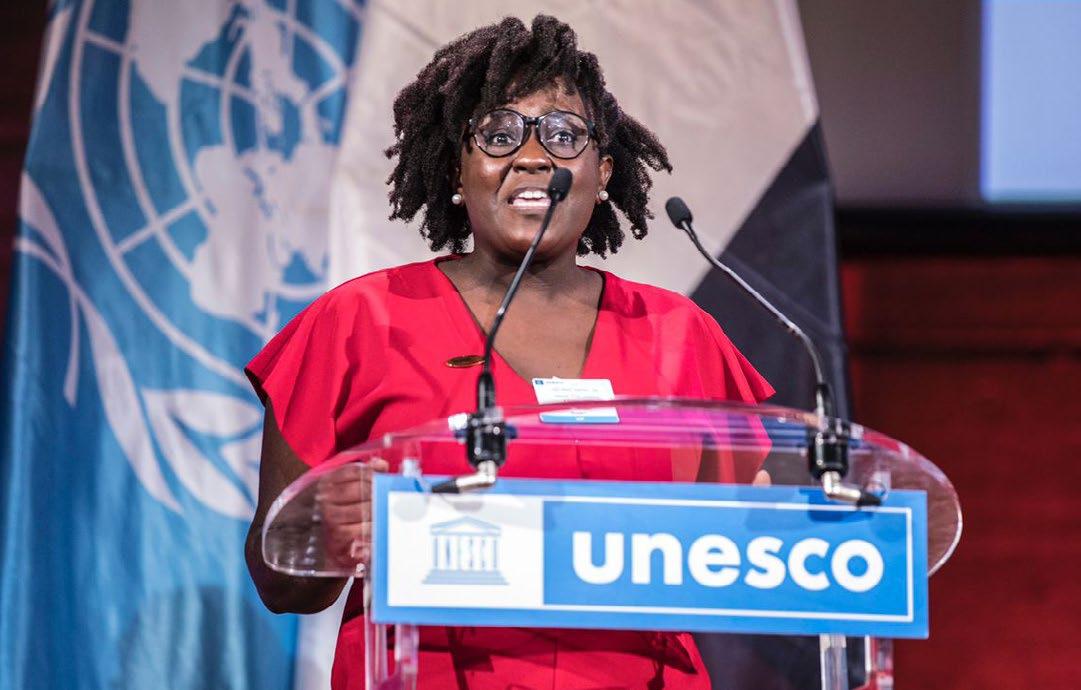
Albert’s organization P 4 H Global enacts community-centered approach to redefine aid in her home country
are getting them for free.” The biggest takeaway? Material charity aid is an outsiders’ strategy. It doesn’t center the Haitian people, which isn’t empowering – a key to meaningful change.
Because of these learning experiences, P4H Global operates on the cornerstone belief that the Haitian people must lead their own transformation. The investment in education goes hand-in-hand with this mission: teachers become students become teachers, and change spreads exponentially, in the people themselves. “Priscilla and I started out training teachers in Haiti, but then we had to take it to the next level,” Dr. Albert explains. “We needed Haitians training Haitians. So our teachers went out into their communities and started training their brothers and sisters.”
For Bertrhude Albert (MALAS 2014), education is transformational. Her own experience is a testament to this: it was the pursuit of education that brought her from her native Haiti to the United States, and the pursuit of education that brought her back home to Haiti to share her gifts.
Dr. Albert is the co-founder of the non-profit initiative P4H Global, alongside business partner and fellow UF alumna Priscilla Zelaya. P4H Global seeks to transform what it means to give aid to Haiti, beyond “clothes and food and shoes,” Dr. Albert says. Instead, P4H Global aims to transform Haiti itself, through investment in education. Building a community of educators through teacher training and personal mentorship, P4H Global prioritizes the empowerment of local leaders.
This mentality, Dr. Albert says, traces directly back to her education in Latin American Studies at UF. “Getting my master’s in Latin American Studies was the best decision I’ve made,” she says. “It ensured that the passion I had for Haiti wasn’t some fleeting emotion. It encouraged me to dig deeper and understand not only the historical context for Haiti, but also the power of community development. I realized that Haiti can rise as a nation, but it’s not going to be with clothes and food and shoes. It’s got to be an investment in the capacity of the Haitian people.”
Listening to Haitian community members also affirmed this approach – the result of an initial attempt to provide aid the traditional way. “Priscilla and I handed out over 400 pounds of clothes and food and shoes, and then we sat down with leaders of the community to ask for feedback,” Dr. Albert shares. “And they told us that while they were thankful for what we did, it actually hurt them more than helped them. Merchants who sell those items can’t conduct their business because their customers
The result? A sprawling network of trained educators in each of Haiti’s 10 departments. An operation that began with only two staff members has expanded to over forty. P4H Global has earned attention on an international stage, too: this year, they were awarded the prestigious UNESCO-Hamdan Prize for Excellence in Teacher Development, which comes with a $100,000 investment to continue their work. It is the first time in the prize’s history that the award has been bestowed on a Haitian institution. Not only that, but Dr. Albert has been appointed as a member of Haiti’s National Commission for Science, Technology and Innovation, putting her in a position to serve Haiti’s educational system through national policy.
Education’s capacity to transform is multi-faceted. In conjunction with her training initiatives within Haiti, Dr. Albert uses social media to transform public perception of Haiti. On TikTok and Instagram, she posts videos telling stories about Haiti’s history, culture, and language to change the narrative about her home. “It’s been so easy for the world to just write Haiti off as a lawless land, as a nation filled with Black people who don’t know how to run the country,” she says. “But that is not our story. We are rewriting our narrative, because the perception of Haiti impacts the way that Haitians view ourselves. Haiti is much more than economic poverty, and much more than the struggles that she faces. One thing that we always say at P4H is that circumstances don’t determine potential. We believe that Haiti is rising.”
Dr. Albert’s conviction for the future stems not only from the love for her people, but her understanding of the past. “Haiti is the first free Black republic in the world. That was the first revolution, the first time we rose above our circumstances. This time it’s going to be education. We are engaged in an intellectual revolution, using our minds, our creativity, and our innovation to transform our land.” ◆
To learn more or make a donation in support: p4hglobal.org
To follow on Facebook, Instagram, YouTube: @P4HGlobal
Dr. Albert’s TikTok, Twitter, Instagram: @Bertrhude
23 Alumni SPOTLIGHT
‘TCD spirit’ guides Alumni Award winner on career path of conservation and community
Marcela Márquez-García (TCD 2016 ) takes a lead in Chilean conservation issues and network of women in conservation across Latin America
From her home country of Chile, Marcela Márquez-García made the decision to attend the University of Florida with the express purpose of participating in the Tropical Conservation and Development (TCD) Program. It had been recommended to her by one of her professors because she was interested in the “human dimensions of conservation” – a defining feature of TCD that isn’t as prioritized in other environmental science programs.
During the application process, Marcela pored over the “TCD framework” paper written by the scholars who would become her mentors: Jon Dain, Karen Kainer, Marianne Schmink, among others. The 2006 publication, officially titled “A Graduate Education Framework for Tropical Conservation and Development” puts forth the idea that conservation education must be interdisciplinary, human-centered, and oriented on practice. The beacon for the TCD program would offer the same guiding light for Marcela herself.
By the time Marcela became Dr. Márquez-García (PhD Interdisciplinary Ecology, 2017) under the supervision of Center affiliate Dr. Susan Jacobson (Wildlife Ecology and Conservation), she had immersed herself in the TCD community and gained a thorough understanding of the “human dimensions of conservation” that had captivated her. “I was so involved in the TCD program,” she reflects. “I was so interested in that framework, how you should focus on a problem from the research standpoint and then learn the skills to work within that problem.”
Classes like Jon Dain’s “Facilitation Skills” and “Conflict Management” helped develop integral interpersonal communication strategies for successful collaboration with stakeholders from different backgrounds – an oft-overlooked facet of conservation work in practice. Dr. Susan Paulson’s “Power and Environment” provided crucial knowledge on the sociopolitical factors that impact environmental problem solving. Above all else, the TCD experience imparted on Marcela the importance of mentorship, practical application of skills, and an interconnected support network.
Inspired by these formative experiences, Dr. Márquez-García returned to Chile invigorated for her career. “I really wanted to apply the knowledge and skills that I had gained,” she shares. But her first job at a prestigious ecology institute didn’t turn out like she had hoped: the leadership there simply wasn’t interested in adopting the TCD model that she aspired to. “It
was frustrating,” Dr. Márquez-García reflects. “I quit, eventually. I wanted to go somewhere where I could develop this TCD spirit of interdisciplinary research and human dimensions.”
One such opportunity arrived at the Wetlands Center of the Austral University of Chile, where she works today. The center’s director, it turned out, had also gotten a PhD at UF, and knew of TCD’s impact. In this role, Dr. Márquez-García was finally empowered to put her education into practice. Not only that, her new director encouraged her to apply to the Chilean Ministry of Environment’s search for experts who could develop implementation guidelines for a national wetlands conservation law that had passed in Chile in January 2020.
In order to be selected by the ministry, each interdisciplinary team had to submit application materials, including curricula vitae of each professional on the team. Dr. Márquez-García’s team narrowly won the selection – with one stand-out skillset that set her team apart from the others. “It turns out the thing that got us the project was my facilitation skills,” Dr. MárquezGarcía laughs. “That one part of my CV gave us the advantage over other teams.”
Through her work with the Ministry of Environment and other networks, Dr. Márquez-García has also had the privilege to contribute to the proposed ecological constitution for Chile. Her work involved collaborating with scientists and lawyers to outline policies regarding water conservation, a crucial issue for Chile’s privatized water system and the consequences of climate change. If an ecological constitution passed, Chile would be only the third country in the world to have legally ensconced the rights of nature and humans alike. “There’s a lot of general support for it in Chile,” Dr. Márquez-García shares. “But there are a lot of private interests, too.” In the end, the proposal was rejected, but Dr. Márquez-García is hopeful there will be an opportunity to try again. (In the meanwhile, her team compiled a book of topics recommended for an ecological constitution, a copy of which Dr. Márquez-García has donated to the TCD Program.)
A recurring theme in Dr. Márquez-García’s career is the necessity of translating ideas into action, part of TCD’s influence. The program’s emphasis on mentorship and community also features strongly in Dr. Márquez-García’s career. Before she had even graduated from UF, she co-founded the Latin American and Caribbean Women in Conservation Network with some peers in an effort to stay professionally
24 Alumni SPOTLIGHT
connected in a field where women – particularly Latin American women – work in the margins.

Today, the network encompasses approximately two thousand members and offers a variety of professional development engagements across Latin America and the Caribbean. The network works to bring together a range of women in conservation (scientists, practitioners, policymakers, and community leaders) to address issues they face working in sustainability and environmental sciences, and build a collaborative network to empower and strengthen women’s impact in Latin American conservation.
Fittingly, the idea for the network was not Dr. MárquezGarcía’s alone. In fact, it was a collaboration supported by mentors like Center faculty Jon Dain and Karen Kainer, and Center affiliate Lyn Branch (Wildlife Ecology and Conservation). With the opportunity to host a workshop for a working group on women in science, the faculty turned over leadership to the students. “We developed the agenda for the workshop, and then it was time to decide who was going to facilitate,” Dr. Márquez-García laughs. “My friends and I, the students, we all looked at Jon. He just said, ‘You should do it.’”
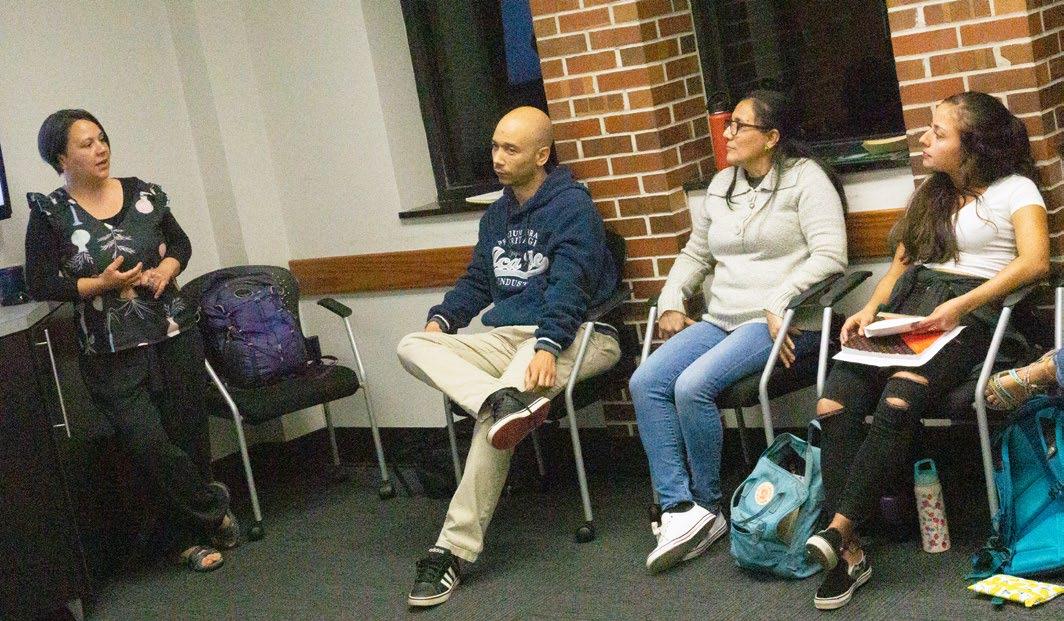
The experience was seminal in Dr. Márquez-García’s early career. It offered her the chance to practice her new skills with the guidance of her professors, which gave her a confidence boost as well as experience to put on her CV. With positive feedback from both professors and participants, the workshop’s success launched not only the Latin American and Caribbean Women in Conservation Network but also Dr. Márquez-García’s career in facilitation.
In November 2022, Dr. Márquez-García returned to Gainesville to accept the Outstanding Young Alumni Award from the Center for Latin American Studies, in recognition of the significant accomplishments she has made in her field. During the visit, she participated in Jon Dain’s “Conflict Management” class – this time as a guest speaker. She offered anecdotes from her professional experience, gave a talk on her work thus far, and answered student questions.

While she was in Gainesville, Dr. Márquez-García received the good news that she was chosen for the L’Oréal-UNESCO For Women in Science Award for Chile, one of only two women in the country to receive the honor. But even with the recognition, she remains focused on her postdoc, which will soon culminate in the establishment of a “Transformation Lab” in Valdivia. “It’s a kind of workshop where we’ll bring together different stakeholders to think about the socioecological system in the city and what we can do to move it forward on sustainable pathways,” she shares. “Valdivia is growing, and we have many wetlands that are being filled, or polluted. So how can we address that, and make the city thrive without compromising the ecosystems that are super important for water management?”
Questions like this are at the center of Dr. Márquez-García’s interests: seeking environmental solutions with consideration to the human dimensions of conservation that brought her to the TCD program in the first place. Equipped with the priorities of interdisciplinary collaboration and practical skills to implement change, her career itself is an application and embodiment of “the TCD spirit,” channeled through her own vision, drive, and talents. ◆
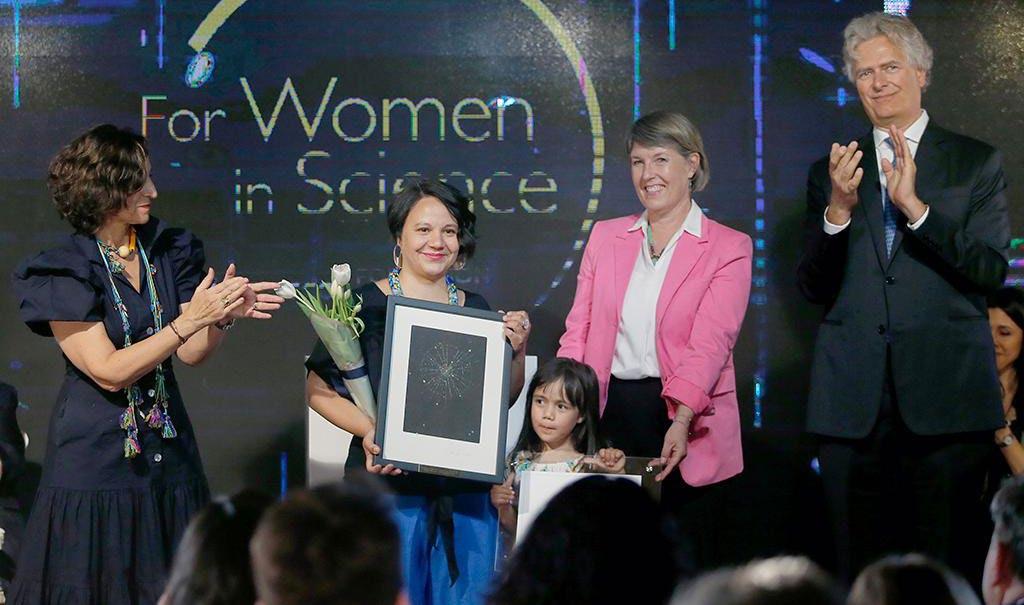
25
Clockwise from top left: Dr. Márquez-García in the field; visiting Jon Dain’s Conflict Management class; receiving the L’OréalUNESCO For Women in Science Award; with Jon Dain after receiving the Center’s Outstanding Young Alumni Award
MALAS Degree
Spencer Rohlwing
Thesis topic: From Intervention to Absence: A Study of Ecuador’s National Military and its Identity under Rafael Correa Specialization: Latin American Politics Chair: Carlos de la Torre
Graduate LAS Certificates
Carolyn Souza Fonseca Da Silva (PhD, Curriculum and Instruction) Evangeline Giaconia (MA, Museum Studies)
MDP Degree
Priya Pershadsingh
Specializations: Organizational Leadership for Nonprofits, TCD, Gender & Development Advisor: Kim Wiley (Family, Youth and Community Sciences)
Capstone Field Practicum: “Developing and Piloting a fundraising strategy for Citizens For A Better South Florida.”
Sustainable Development Practice Certificate
Jada Campbell, MA in Political Science
Tropical Conservation and Development Graduate Concentration and/or Certificate Autumn Danielle Rose, MA, Anthropology
Alumni UPDATES
Alumni: please complete our Alumni Update Form online at: bit.ly/3s5H2KA and share your news! If space permits, we will include your update in the next edition of the Latinamericanist. Here’s the latest from some of our alumni:
Kevin Fox (LAS graduate certificate, 2009)
A foreign service officer for the US Agency for International Development (USAID) since 2009, Mr. Fox has been assigned to Lima, Peru where he will coordinate regional USAID environmental programs in the Amazon basin over the next four years. Mr. Fox was previously a Peace Corps volunteer in Paraguay, and director of a condominium construction project in Guanacaste, Costa Rica.
Will Boose (MALAS 2020)
Tonyaa Weathersbee (LAS graduate certificate, 2016)
Ms. Weathersbee is now bureau chief for Chalkbeat Tennessee. Chalkbeat is a non-profit news organization that focuses on education equity. It operates eight bureaus throughout the nation, and Ms. Weathersbee is responsible for leading its journalism in Tennessee.
Hannah
Toombs (LAS graduate certificate, 2022)
Dr. Toombs finished her PhD in Cultural Anthropology and Latin American Studies, having spent most of the last year finishing dissertation research and writing in western Honduras. She is also now the Engaged Learning Librarian at Cornell University’s social science and humanities library (Olin Library). In the role, she will develop instructional materials focused on critical information literacy research and writing skills for first-year undergraduate students, primarily in social science and humanities majors.
Mr. Boose is in his third year of doctoral studies at Emory University, where he has extended his research with mototaxistas (motorcycle taxi drivers) in Perú. He has three publications set to come out based on his work in Lima and Iquitos: 1. a history of mototaxis in Iquitos and Lima (Histórica) 2. an analysis of the mobilities and spaces that mototaxistas produce in Lima, (ENSAYO - Revista Arquitectura PUCP) and 3. a photo essay documenting state and elite attempts to push mototaxistas out of “Lima Moderna,” (Revista Latinoamericana de la Antropología del Trabajo). In personal news, Mr. Boose is now a father of two!
Michael Handelsman (LAS graduate certificate, 1976)
26 Student
GRADUATIONS
FALL
2022
After 42 years at the University of Tennessee as a Professor of Latin American Literature/Director of Latin American Studies/Director of Global Studies, Dr. Handelsman retired as Professor Emeritus. He was also named Miembro Correspondiente de la Academia Ecuatoriana de la Lengua. 2022 ALUMNI AWARD WINNERS Marcela MárquezGarcía, Outstanding Young Alumni Award (SEE PAGE 24) Francisco X. Santeiro, Lifetime Achievement Alumni Award CONGRATULATIONS!
Leslie Anderson (Political Science) Book launch: La Democratizacion a traves de las instituciones: los años de la transicion en perspectiva comparativa at prometeoeditorial. net/productos/democratizacion-a-traves-delas-instituciones-la/ and YouTube presentation and book launch at youtu.be/VSDL-4IV_gw
Luis Álvarez-Castro (Spanish & Portuguese) Published an annotated edition of the 1891 novel Carne importada, by Eduardo López Bago. Written and set in Buenos Aires, this naturalist novel depicts the international prostitution rings that operated in the Río de la Plata region in the late 1800s. https://www. editorialrenacimiento.com/biblioteca-derescate/2714-carne-importada.html
Thomas T. Ankersen (Law, Emeritus) Publication: Gardner, R.C., Ankersen, T., Finlayson, C.M., Okuno, E. & Pritchard, D., (forthcoming). Ramsar at the National Level: Application and Incorporation into Domestic Law. In: Gell, P.A., Finlayson, C.M. &Davidson, N. (eds), Ramsar Wetlands: Values, Assessment, Management (Elselvier Aquatic Science Series). Walker, J.E., T. Ankersen, S. Barchiesi, C.K. Meyer, A.H. Altieri, T.Z. Osborne, C. Angelini (2022) Governance of the mangrove commons: Advancing the cross scale, nested framework for the global conservation and wise use of mangroves. Journal of Environmental Management 312: 114823.
Trent Blare (Food & Resource Economics)
Invited talks: (1) Application of transformative research to build inclusive and sustainable food systems: Experiences from Latin America and South Florida. University of Bern Center for Development & Environment Brown Bag Series. Bern, Switzerland. September 6, 2022. (2) Are environmental and social justice goals mutually exclusive? Exploring inclusive businesses in Peru’s cacao and coffee sectors. Oral Presentation. 58th Annual Meeting of the Association for Tropical Biology and Conservation. Cartagena, Colombia. July 13, 2022.
Mark Brenner (Geological Sciences) Award: International Paleolimnology Association Rick Battarbee Lifetime Achievement Award Publications: (1) Brenner, M. 2022. Classics revisited/From the archive. Mayan Urbanism: Impact on a Tropical Karst Environment. Prog Phys Geog. (2) Kennett et al. 2022. Drought-induced civil conflict among the ancient Maya. Nat Clim Change 13:3911. (3) Waters et al. 2022. Harmful algal blooms and cyanotoxins in Lake Amatitlán, Guatemala, coincided with ancient Maya occupation in the watershed. Proc Nat Acad Sci (USA) 118 No. 48 e2109919118. (4) Lohse et al. 2022. Early maize in the Maya area. Lat Am Antiq. Pp. 1-16.
Kaira M. Cabañas (Art + Art History) has been appointed associate dean of academic programs and publications for the National Gallery of Art’s Center for Advanced Study in the Visual Arts (the Center). While her appointment at the Center begins March 27, she will continue some work for UF in the Spring: teaching the graduate Curatorial Studies seminar, editing the publication for Institute for the Study of Latin American Art (ISLAA)-sponsored exhibitions, advising PhD students, and serving as a faculty mentor. For the press release see: https://www.nga.gov/ press/2022/kaira-cabanas.html
Kathleen Colverson (Animal Sciences) spent the summer as Fulbright Scholar in Ecuador working with colleagues from FLACSO University. The write-up on this experience can be found at: https://bit. ly/3VMPOeU. Workshops and trainings: Created a number of training materials and facilitated a workshop on “Integrating Gender into Agricultural Research – a Practical Workshop” for graduate students and faculty at FLACSO in July 2022.
Daniel Contreras (Anthropology)
Invited talks: Two invited talks at the VIII Coloquio Internacional de Arqueologia de la Fundación Wiese en Lima, Peru (Balances y perspectivas sobre cronologías de la Costa Norte del Perú); Publication: Vining, Benjamin R, Aubrey Hillman, Daniel A Contreras, and Ernesto Tejedor. “Expanded Agroecological Niches and Redistributed Risks in Northern Peru’s Chicama Valley during Late-Holocene ENSO Climate Changes.” The Holocene 32(12), September 2022
Max Deardorff (History)
Publication: “Synods and Councils of the Hispanic World, 1300-1700” in Max Planck Institute for Legal History and Legal Theory Research Paper Series No. 2022-14: subsidia et instrumenta, 1-92 Conference presentations: (1) “The Persistence of an Indigenous Slave Trade in Colonial New Kingdom of Granada,” Southern Historical Association – Latin and Caribbean Section, Baltimore (MD), November 12, 2022. (2) “Diversification in the Colonial Courts: Native and Mestizo Attorneys, Magistrates, and Scribes in the New Kingdom of Granada (1550-1680),” American Society for Legal History Annual Conference, Chicago (IL), November 11, 2022. Invited talk: Vrije Universiteit Amsterdam (Netherlands): “”Royal Galleys of the Spanish Caribbean: Artifacts of the First Age of Globalization,”” May 30, 2022.
Carlos de la Torre (LAS)
Book chapter: “El populismo y las emociones en Ecuador” in José Manule Reivera Otero, Nieves Lagares Diez, Pablo Oñate, Paulo
Carlos López-López, eds., Emocions, Política y Comunicación en Ecuador, Quito: Pontificia Universidad Católica del Ecuador, 2022, pp 11-35. International Conference Participation: “El concepto de populismo: críticas, defensas, retos” El populismo como categoría conceptual y como práctica política: alcances y límites” ITESO Universidad Jesuita de Guadalajara 1-2 September 2022. Invited Lectures: (1) “Populismos Globales” FLACSO-Ecuador, September 20, 21, 2022 (2) “Populismo: estratexias conceptuais e debates” Ateneo de Santiago de Compostela, June 27, 2022.
Karen Garrett (Plant Pathology)
Publications: (1) Buddenhagen*, C. E., Y. Xing*, J. Andrade Piedra, G. A. Forbes, P. Kromann, I. Navarrete, S. Thomas-Sharma, R. A. Choudhury, K. F. Andersen, E. Schulte-Geldermann, B. A. Etherton, A. I. Plex Sulá, and K. A. Garrett. 2022. Where to invest project efforts for greater benefit: A framework for management performance mapping with examples for potato seed health. Phytopathology 112:14311443. https://doi.org/10.1094/PHYTO-05-200202-R (2) Navarrete, I., V. López, R. Borja, P. Oyarzún, K. A. Garrett, C. J. M. Almekinders, Y. Xing, P. C. Struik, J. L. Andrade-Piedra. 2022. Variety and on-farm seed management practices affect potato seed degeneration in the tropical highlands of Ecuador. Agricultural Systems 198:103387. https://doi.org/10.1016/j. agsy.2022.103387
Libby Ginway (Spanish & Portuguese) directed and taught in the Rio program Summer B 2022, gave a closing keynote in Portuguese for the conference Cartografias da Crise for the Universidade Federal Fluminense in September and another for the symposium Speculative Fiction from Latin America at UCLA in October, and published a chapter in an edited volume Posthumanism in Latin American SF.
Lillian Guerra (History) New book: “Patriots and Traitors in Revolutionary Cuba, 1961-1981,” Jan. 2023. The book draws on a diversity of sources, including previously undiscovered and private archives, to reveal how young Cubans especially coped with pressures to become not only good revolutionaries, but in the 1970s and early 1980s, “perfect Communists” modeled after Soviet example. New project: This Jan. 2023, Prof. Guerra launches Cuban Studies website to explore paradoxes of Cuban history and daily life, especially in post-Soviet era. Key features include “Gems of the Archive” highlighting unique objects or documents and “Fotodiario,” an original photographic collection with mini-essays analyzing the nature of change in Cuba. The site also promises edited and fullcut interviews, starting with economist Camelo Mesa-Lago.
27
NEWS
Faculty
& PUBLICATIONS
Rebecca Hanson (LAS) Conference event: Author Meets Critic session for The Paradox of Violence in Venezuela (editors David Smilde, Verónica Zubillaga, and Rebecca Hanson). 2022. Social Science History Association, Chicago, November 18. Conference organizer (with David Smilde and Verónica Zubillaga) Asegurando Justicia para Víctimas de la Violencia. 2022. Caracas, Venezuela. Venezuela. July 6- 8. Awards: 2022 International Educator Award, University of Florida.
Benjamin Hebblethwaite (Languages, Literature, and Culture) Awards: With Mariana Past, Honorable Mention for the Isis Duarte Book Prize of the Latin American Studies Association as well as Honorable Mention for the Lois Roth Award of the Modern Language Association for translation and edition of Stirring the Pot of Haitian History by Michel-Rolph Trouillot (Liverpool University Press 2021). Published articles: (1) “Hangul in Korea and Kreyòl in Haiti: Indigenous Languages and Spelling Systems in Religious and National Development” for the Luce Foundation and The College and Vice Provost for Research at Indiana University, (2) “Kòltiz, a Patriotic Haitian Practice of Solidarity: Haitian collaborative groups affirm that ‘every human is human” for Foreign Policy.
Berta Hernández-Truyol (Law) Award and keynote: Kate Stoneman Award, given annually to individuals who have demonstrated a commitment to seeking change and expanding opportunities for women within legal profession; delivered the keynote lecture at Albany Law School. Publications: “Awakening the Law: A LatCritical Perspective,” Seattle Journal for Social Justice. The article posits that the law is asleep and needs “awakening.” Awakening is a realization of truths otherwise obscured by our perceptual playbooks— learned narratives that create rote scripts in our minds founded upon family, culture, religion, and a skewed majoritarian version of “history and tradition” among other factors. Awakening deconstructs the learned myths that perpetuate the status quo and allows the bettering of humanity.
Emily Hind (Spanish & Portuguese) Award: Professor of the Year from the UF Graduate Students in Literature 2021-2022; Co-Recipient with Katerie Gladdys of the Quest Pilot TeamTeaching Grant for “What’s Your Energy Story? Confronting Oil by Seeing Plants”; Interview: With Ave Barrera, “Ave Barrera al precipicio de la introducción al mundo anglófono.” Article: A Contracorriente. Vol. 10, No. 3 (2022), pp. 327344. https://acontracorriente.chass.ncsu.edu/ index.php/acontracorriente/article/view/2238
Andrew Janusz (Political Science) published an article in Electoral Studies with three UF undergraduates, Andy Jarrin, Tali Faerman, and Karina Bravo, “Electoral Colorism: Candidate Skin Color and List Placement in Ecuador” as well as presented research at the Second
Continental Conference on Afro-Latin American Studies.
Philip Janzen (History) “Linga’s Dream? Interpreters, Entextualization, and Knowledge Production in Central Africa,” The American Historical Review 127, no. 2 (June 2022): 755-785.
Karen Kainer (LAS/School of Forest, Fisheries, and Geomatics Sciences) Humphries, S., K. Kainer, D. Rodriguez-Ward, A.L. Violato Espada, T. Holmes, P. Blanco Reyes, J. da Silva Santos, and M.M. Ribeiro da Silva. 2022. Pathways to community timber production: A comparative analysis of two well-established community-based forest enterprises in Mexico and Brazil. Pages 65-87 (Chpt 5), In: Bulkan, J., J. Palmer, A. M. Larson, and M. Hobley (Eds.), Handbook of Community Forestry. Routledge. DOI: 10.4324/9780367488710-7.
Richard Kernaghan (Anthropology) New book: Kernaghan, Richard. 2022. Crossing the Current: Aftermaths of War along the Huallaga River. Stanford University Press. Short text: Kernaghan, Richard. 2022. “El resplandor.” Anthropology News website, August 29, 2022.”
Clate Korsant (LAS) Publications: (1) “Playing Chess in Public: Recreational Traditions in a Time of Crisis,” in Streetnotes (29) Special Issue: New York City in Transformation, 79-94. https:// doi.org/10.5070/S529057452 (2) “A Freirean Ecopedagogy or an Imposition of Values? The Pluriverse and the Politics of Environmental Education,” in Globalizations Special Issue: Education and Socio-Environmental Justice in the Pluriverse; https://doi.org/10.1080/1 4747731.2022.2038830 Conferences: 11/1012/2022. “A socioenvironmental future? The commodified nature experience as a site of extraction,” and, “Ecopedagogy and the Politics of Environmental Education,” American Anthropological Association, annual meeting: Unsettling Landscapes, Seattle
Lucas C. Majure (Florida Museum of Natural History) Award: International Educator of the Year (Junior Faculty), Florida Museum of Natural History, Nov. 2022. Publications: (1) Majure, L.C., E.R. Bécquer, J.D. Skean, Jr., and W.S. Judd. 2022. Patterns of diversification of Miconia (Miconieae) in the Greater and Lesser Antilles. Pp. 645–671, In: Goldenberg, R., F. Almeda, and F.A. Michelangeli (eds.), Melastomataceae. Systematics, Evolution and Ecology of Melastomataceae, Springer, Switzerland. https://doi.org/10.1007/978-3-030-99742-7_29 (2) Breslin, P., M. Wojciechowski, and L.C. Majure. 2022. American Journal of Botany https://doi.org/10.1002/ajb2.16048 (3) Majure, L.C., D. Barrios, E. Díaz, L.F. Bacci and Y. Encarnación. 2022. Taxon 71: 993–1012. https:// doi.org/10.1002/tax.12791 “
Carmen Martínez Novo (LAS) Presentations: (1) Undoing Multiculturalism, Graduate
Program in Socio-Cultural Anthropology, Benemérita Universidad Autónoma de Puebla, Mexico, 11-10-2022. (2) Discussion of special issue launch “About Mexican Formations.” Dialectical Antropology, 46(2), Instituto de Ciencias Sociales y Humanidades, Benemérita Universidad Autónoma de Puebla, Mexico, 11-112022. (3) “Exclusion, Inclusion and Indigenous Politics in Ecuador and Latin America” Talk for the Foreign Service Institute of the US Department of State. (4) Chair and organizer of the featured session “Race, Racism, Antiracism: a Conversation Between Research Networks.” LASA 2022 virtual congress May 5-8, 2022.
(5) Presented in round table “Against Racism: Organizing for Social Change in Latin America” LASA 2022 virtual congress, May 5-8, 2022.
Paul Ortiz (History) My work as an oral historian is featured in the current issue of the US Latina & Latino Oral History Journal.
Susan Paulson (LAS) Publications: (1) Economic growth will continue to provoke climate change. The Economist Impact. (2) Strategic Entanglements. In Degrowth & Strategy: how to bring about social-ecological transformation. (3) Co-editor LABE Report: Towards a green and equitable post-COVID recovery. Keynote and Invited Lectures: (1) Un diálogo pluriversal entre la resistencia al extractivismo y los movimientos constructivos. PUCE, Ecuador. (2) Radically Rethinking Gender in Ecosocial Change. Lund University, Sweden. (3) Pathways through the Capitalocene. Institute of Technology, Karlskrona, Sweden. (4) From pandemic crisis to transformation with attention to masculine and queer experiences. Lund University, Sweden. (5) Forging gender systems that produce and sustain healthier humans and worlds. Seoul National University, Korea.
Charles A. Perrone (SPS emeritus) published a paper based on a course development grant from the Center in 2006. “Jorge Amado e imaginários baianos: uma história pedagógica inter-americana.” _III Webinário Estudos Amadianos: 110 anos de nascimento de Jorge Amado_. Ed. Gildeci de Oliveira Leite et al. Cachoeira, Bahia, Brasil: Portuário Atelier Editorial, 2022. 278-86. / Published _All Poetry_, translation of _Toda Poesia_ by Paulo Leminski. Trans., ed. and afterword. New London, CT: New London Librarium, 2022. With Ivan Justen Santana (cotrans.) and Alice Ruiz S. (co-ed.).
Stephen Perz (Sociology and Criminology & Law) is now Chair of the Department of Sociology and Criminology & Law.
Publications: (1) Stephen G. Perz, Elsa R.H. Mendoza, and Alan dos Santos Pimentel. “Seeing the Broader Picture: Stakeholder Contributions to Understanding Infrastructure Impacts of the Interoceanic Highway in the Southwestern Amazon.” World Development 159:106061. Article 15 published pages. https:// doi.org/10.1016/j.worlddev.2022.106061
28
(2) Alexandra Sabo, Vanessa Luna-Celino, Pamela Montero-Alvarez, Sinomar Ferreira da Fonseca Junior, Martha Rosero-Peña, Carolina de Oliveira Jordão, Carla Mere Roncal, Robert Buschbacher, Andrea Chavez, and Stephen Perz. “The Wisdom of Hindsight: A Comparative Analysis of Timelines of Environmental Governance of Infrastructure Across the Pan-Amazon.” Ecology & Society 27(1): article 28. Article 19 pages. https://doi. org/10.5751/ES-12683-270128
Jack Putz (Biology) Together with an international group of foresters and ecologist, Jack Putz recently published a paper on sustained timber yields in PNAS Nexus. Although foresters have stressed the importance of sustainability for hundreds of years, overuse has eroded the meaning of the term. This paper represents an effort to clarify what is meant by sustained yields. Putz, F.E., C. Romero, P. Sist, G. Schwartz, I. Thompson, A. Roopsind, Ruslandi, V. Medjibe, and P. Ellis. 2022. Sustained timber yield claims, considerations, and tradeoffs for selectively logged forests. PNAS Nexus 1: 1-7. doi.org/10.1093/pnasnexus/pgac102. On a topic even closer to the heart, Jack just published a book of poetry titled: “From One Old Dog To Another,” which would be a great present for anyone with an aging canine companion.
Mary Risner (LAS) was the keynote speaker for the 5th International ESP/LSP Conference in Niš, Serbia in September through a US Embassy program. She was voted in as president-elect of the American Association of Teachers of Spanish & Portuguese (AATSP), a 105 year old national association with close to 10,000 members. She also is the recipient of a $16,000 grant from the Longview Foundation to strengthen the Center’s efforts to bring Latin American into US classrooms through Virtual Exchange at K-12 and state college campuses.
Maria Rogal (Art+Art History) Along with affiliate faculty Raúl Sánchez and Laura Gonzales and UF colleagues, led the conversation “Design and Rhetoric against Coloniality” at the 2022 Design Research Society Conference in Bilbao. Their conversation contributes to and influences this process of explicit multidisciplinary intertwining, exploring the implications of connecting rhetoric and design against coloniality, the possibilities of making these connections in research and teaching, and the conceptual and practical difficulties that lie ahead as the field continues to look beyond historically narrow borders.
Maya Stanfield-Mazzi (Art+Art History)
Conference paper: “Feathered Hats and Bird Bodies in the Eighteenth-Century Andes,” at
2022 American Society for Ethnohistory Annual Conference, Lawrence, Kansas. Book chapters: (1) “Catholic Cloth: Authority, Decorum, and Transcendence in the Spanish American Church,” in Painted Cloth: Fashion and Ritual in Colonial Latin America, ed. Rosario I. Granados. Chicago: University of Chicago Press and Blanton Museum of Art, 2022. (2) “The Virgin of Bethlehem,” in Archive of the World: Art and Imagination in Spanish America, 1500–1800: Highlights from LACMA’s Collection, ed. Ilona Katzew. Los Angeles: DelMonico Books/ LACMA, 2022. Article: Co-authored with Lia Brusadin: “Representations of the Passion of Christ in Brazil: Devotional Sculpture as Open Artwork.” Religions 13, no. 1138 (2022): 1–16.”
Catherine Tucker (LAS / Anthropology) Invited talk: “Resiliencia ante el Cambio Climático visto antropológicamente desde las organizaciones de productores y productoras de café” Cumbre para la Sostenibilidad del Café en la Región PROMECAFE. November 24, 2022 , San Pedro Sula, Honduras. Co-organized: Moving Mountains Summit. Basalt, Colorado. Sept 23-25. “
Paola Uparela (Spanish & Portuguese) Awards: (1) LASA - Culture, Power & Politics Section Award. (2) Best Paper - Senior Category for the work: “”Recogimiento y buen gobierno: jurisdicciones para la re-producción y multiplicación de los indios.” Publications: “‘Yo llana estoy’ o el despliegue de una virginidad queer.” Journal of Gender and Sexuality Studies 48.1 (2022): 53–74.Fellowships: Rothman Summer Fellowship for the project: “Well-Being Policies for the (Re)production of the Indigenous Population: Las Casas’s Remedies (1516) in Guaman Poma’s Good Government (1615)”. Center for the Humanities and the Public Sphere, University of Florida. Organization of academic events: Lecture by Ricardo Padrón, 2022-2023 Distinguished Visiting Scholar - Phi Beta Kappa Honor Society (Oct 5 – 6, 2022). “
Pilar Useche (LAS / Food & Resource Economics) (1) Van Asselt, J. and P. Useche. 2022. “Agricultural commercialization and nutrition; evidence from smallholder coffee farmers.” World Development, Volume 159. (2) Anglade, B., Useche, P. and C. Deere. 2022. “”A Gendered Analysis of Individual-Level Asset Poverty in Ecuador.”” Feminist Economics, Volume 28(1). (3) Liu, W., Onel, G. and P. Useche. 2022. “Why has the agricultural use of reclaimed water been declining in Florida.” Southern Agricultural Economics Association, Abstract.
Margarita Vargas-Betancourt (Latin American and Caribbean Collection) In August 2022, the Farmworker Association of
Florida, the Rural Women’s Health Project, UF’s George A. Smathers Libraries, and the University of Miami Libraries obtained a planning grant to investigate best practices to include the stories of Florida farmworkers in historical archives. The “Archiving Farmworkers’ Histories” project, made possible through an Institute of Museum and Library Services (IMLS) National Leadership Grant, aims to create safe, cooperative spaces to archive and access community’s stories, including oral histories. The project is part of the Latin American and Caribbean Diaspora Initiative, which documents the histories of migrants at UF’s Latin American and Caribbean Collection.
Wagner Vendrame (Environmental Horticulture) Publications - Refereed journal articles - 11 Presentations: (1) Plant Propagation by Tissue Culture. VII Symposium on Plant Production and Associated Bioprocesses. June 8. Universidade Federal de São Carlos (UFSCar), Limeira, Brazil. June 8. (2) Embryo development on seed germination of silver saw palmetto. Florida State Horticultural Society, Sarasota, FL. June 6. Awards: (1) Excellence in Teaching and Learning with TechnologyNACTA. (2) Teaching Excellence Faculty Fellow – College of Agricultural and Life Sciences, UF International Proposal - Building a framework for sustainable student and faculty engagement and exchanges between University of Florida and University of Antioquia”, 100K Strong Innovation Fund at Partners of the Americas and the Bureau of Western Hemisphere Affairs (WHA) of the U.S. Departmemt of State (DOS)
Robert Walker (LAS / Geography) published articles in leading environmental and geographic journals including Global Environmental Change, GeoHumanities, Land Use Policy, and The Conversation. He continued work on his new NSF award studying resource management strategies by Ecuador’s Indigenous population.
Robin M. Wright (Religion) In press: Cities of Transformation and Power in the Baniwa and Kuripako Cosmos, in Fernando SantosGranero and Emanuele Fabiano, eds. Urban Imaginaries in Native Amazonia, Tucson: University of Arizona Press. Publications: (1) “The ‘Sparks of Kuwai’: Baniwa Cosmovision, Covid-19, and the ‘Nós Cuidamos’ [We Care] Campaign.” Journal for the Study of Religion, Nature and Culture. Religion and the Coronavirus Pandemic (Special Issue). JSRNC, 16:1. (2) “The Powers of the Sacred. Portals, Shamans and Amazonian Spirits”, ReVista. Harvard Review of Latin America. David Rockefeller Center for Latin American Studies. Special issue on the Amazon. https://revista. drclas.harvard.edu/spring-summer-2020-2/
The contents of this newsletter were developed under the National Resource Center grant from the U.S. Department of Education. However, those contents do not necessarily represent the policy of the U.S. Department of Education, and you should not assume endorsement by the Federal Government.
29
Thank you TO OUR DONORS
The Center for Latin American Studies would like to express gratitude for the generosity of those who have contributed to the Center’s funds and endowments:
Bacardi Family Eminent Scholar Chair in Latin American Studies
Christina M. Reid-Douglas & Andrew J. Douglas
Boonstra Family Research Fellowship*
Margaret Boonstra
Genevieve Haugen
John E. III & Leslie H. Knight
Roslyn F. & Norman S. Levy Barbara M. Moore
Oak Hammock at the University of Florida
Carmen Diana Deere Director’s Fund
Janet Bente & Todd L. Romero
Leonardo A. Villalon & Fiona McLaughlin Francisco X. Santeiro & Jeannette M. Valdes-Santeiro
Jacqueline Friel & Jonathan Friel International Travel Fund Anonymous
Latin American Studies Alumni Graduate Student Travel Fund Claudia Happel
Latin American Studies Unrestricted Sonia E. Pereira
Donald & Patricia R. Ramos
Reset Dialogues U.S. Eduardo M. Silva & Enid Torregrosa Eugene F. Taggart
Tropical Conservation & Development Fund Maxwell-Hanrahan Foundation
Fundacion CRISFE Gordon & Betty Moore Foundation Kislak Family Foundation
* Donations made in loving memory of Margaret Beshore Boonstra, who passed away on April 12, 2022.
Alicia Reynolds Outreach Coordinator
David Nuñez Research Admin Assistant
Luis Álvarez-Castro Spanish and Portuguese College of Liberal Arts and Sciences
Renata Serra African Studies Center for African Studies
▶ Have a story you'd like to see in The Latinamericanist?

Please email Christa Markley at communications@latam.ufl.edu . The Latinamericanist features the impact of the UF Center for Latin American Studies through the experiences and accomplishments of its students, faculty, and alumni. Relevant stories will be considered for publication.
FIND US ONLINE:



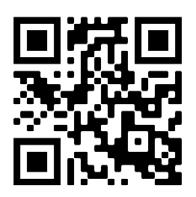
30
Connect WITH US latam.ufl.edu
Welcome NEW AFFILIATE FACULTY
Welcome NEW STAFF
Center for Latin American Studies
319 Grinter Hall P.O. Box 115530 Gainesville, FL 32611-5530
GIVING TO THE CENTER FOR LATIN AMERICAN STUDIES
We rely on contributions from our friends and alumni to support certain special activities such as student field research, travel to conferences, and seed support for larger fundraising efforts. If you would like to make a donation to the Center, please visit the Center’s online giving page at go.ufl.edu/las-give or fill out the form below.
MY GIFT IS TO BENEFIT:
• Boonstra Family Research Fellowship (014091)
• Carmen Diana Deere Director’s Fund (019905)
• Carol French Doughty Memorial Fund (016269)
• Colonel Glenn A. Farris Scholarship (005067)
• Cuba Program Fund (017435)
• Florida-Brazil Institute (007277)
• Peter E. and Marie E. Hildebrand Scholarship Fund (022009)
• LAS Alumni Graduate Student Travel Fund (012521)
• Latin American Studies Fund (011147)
• McCoy Travel Scholarship Fund (014527)
• MDP Program Unrestricted (020485)
• Hugh L. Popenoe Mesoamerican Research Endowment (018331)
• Richmond F. Brown Graduate Student Fund (020871)
• Safa Graduate Student Travel Endowment (013515)
• Schmink Fund for Innovation in TCD (018201)
• Tropical Conservation and Development Fund (017809)
• Vivian G. Nolan Graduate Fellowship in LAS (016143)
• Wagley and Carter Fellowships (004763)
GIFT AMOUNT:
$500 $250 $100 $50 $_________
Name: Address: City/State/Zip: Email:
METHOD
OF PAYMENT:
• Check (Make check payable to: UF Foundation, Inc.) Please send your check with this form to: University of Florida Foundation Gift Processing Department P.O. Box 14425 Gainesville, FL 32604-2425

• Credit Card
Call the UF Foundation’s Gift Processing toll-free number with your credit card information: 1-877-351-2377
This secure line is staffed Monday – Friday from 8:00 am to 4:30 pm
• Online at go.ufl.edu/las-give






























 BY VERONIKA THIEBACH
BY VERONIKA THIEBACH








































